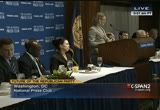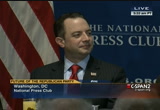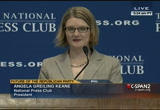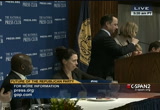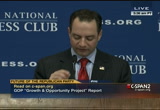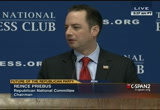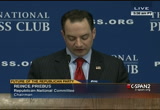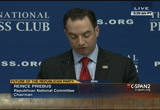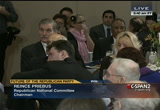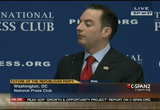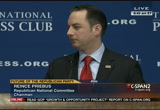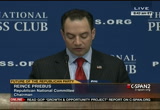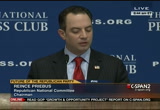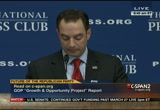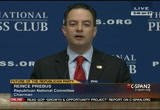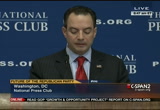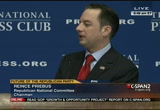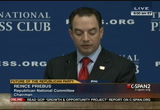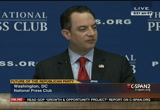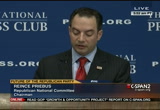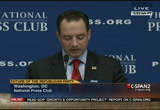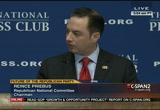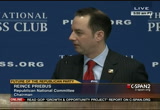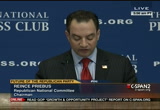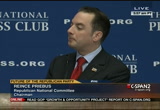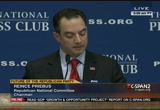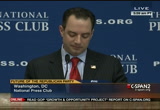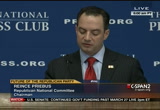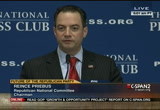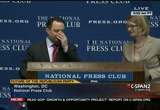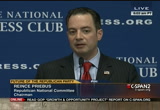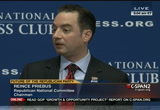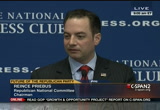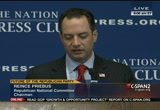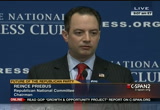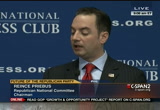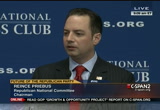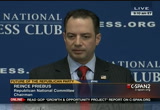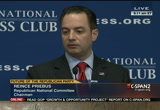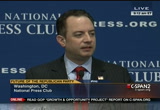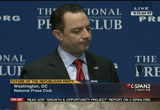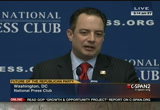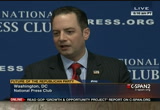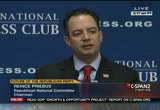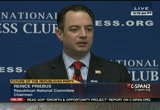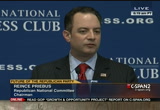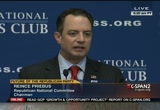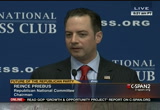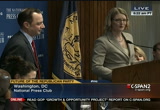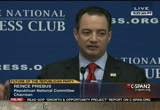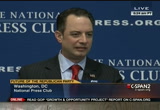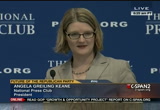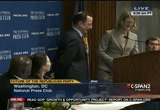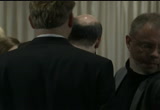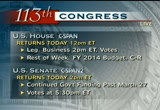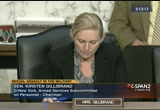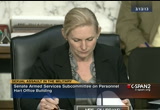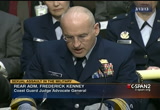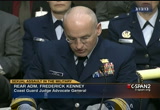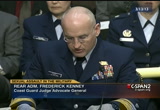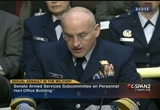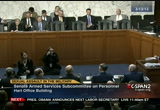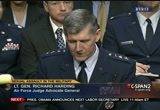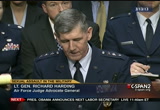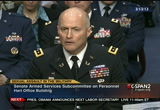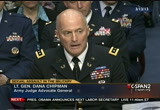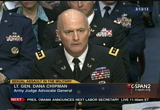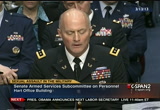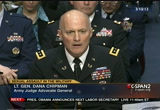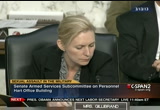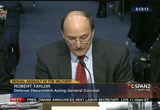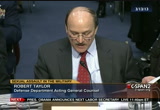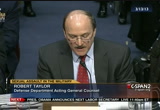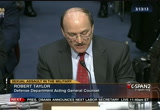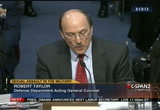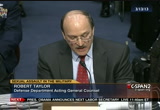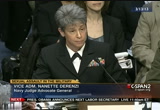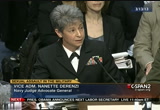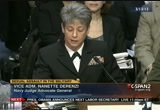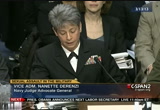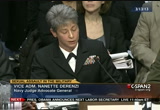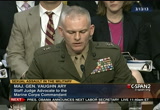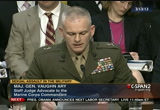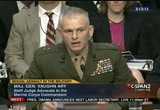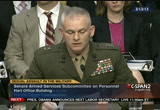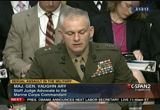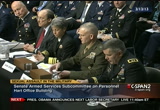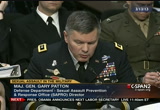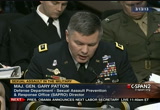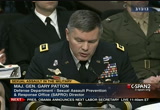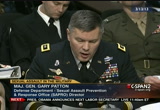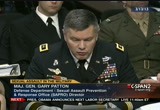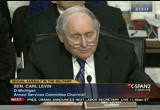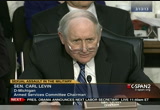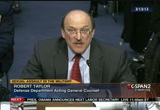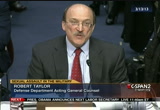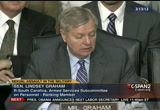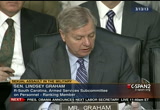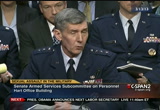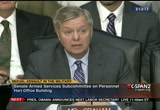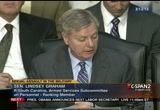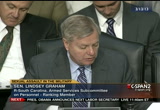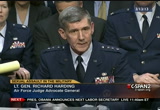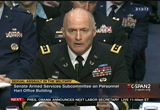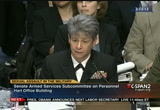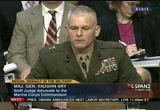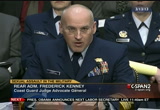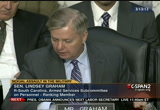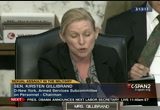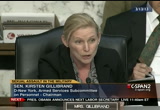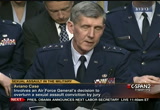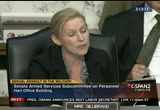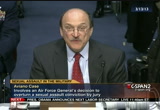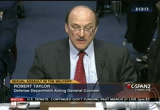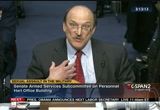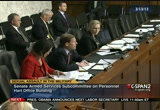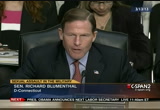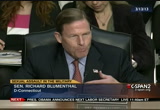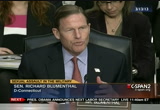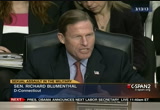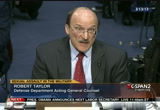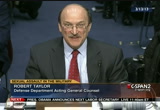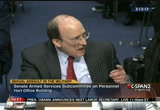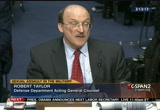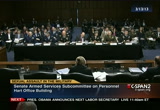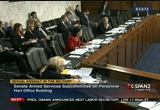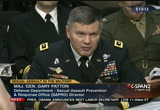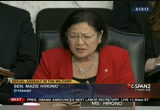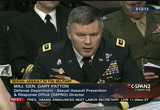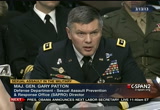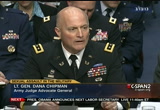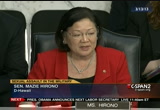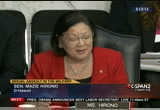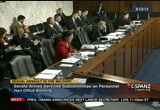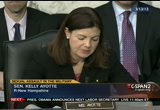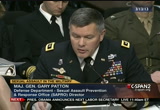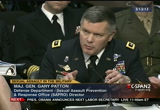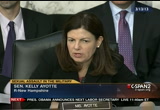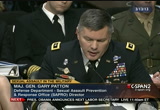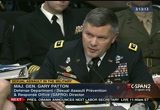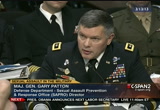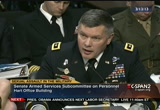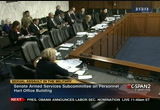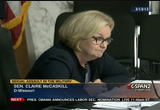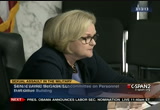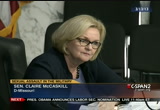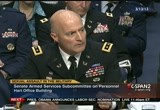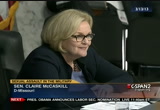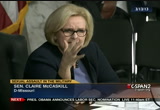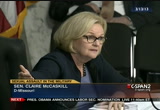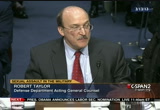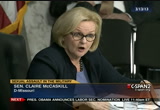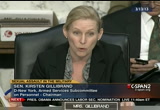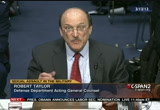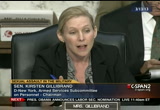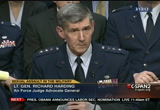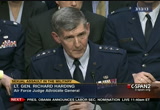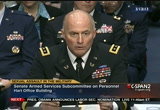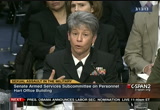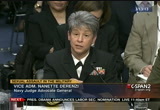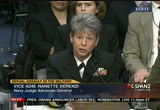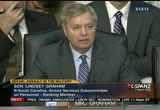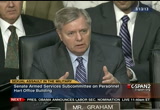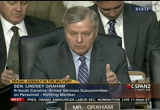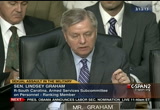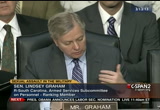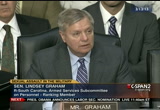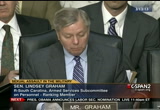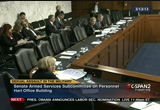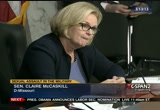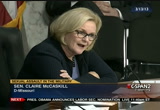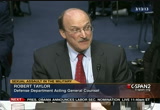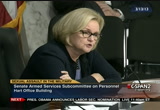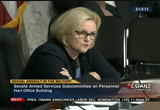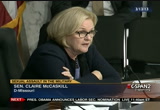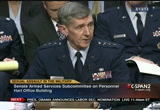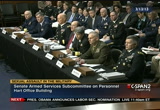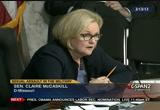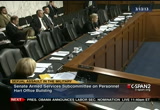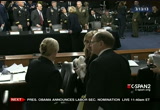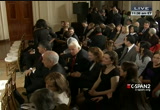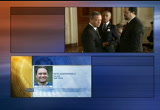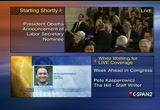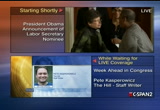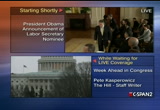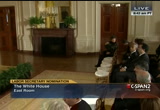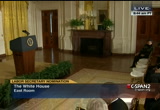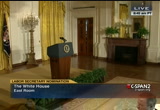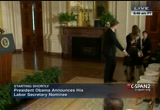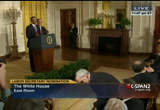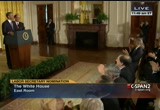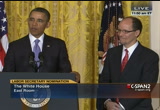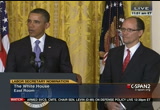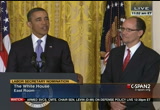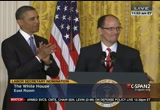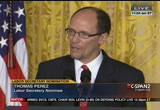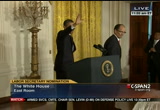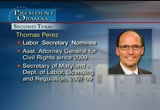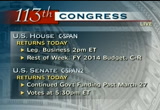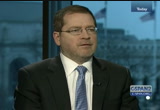tv U.S. Senate CSPAN March 18, 2013 8:30am-12:00pm EDT
8:30 am
[laughter] >> host: where did you come up with the idea? >> guest: you know, 3-d printers have been around for about 25 year, but they were mainframe-size machines that were really expensive. i wanted one, but i couldn't afford one. so i, so some friends and i got together, and we started tinkering. and when it worked, we quit our jobs and started makerbot so everybody could have one of these. of. >> host: bre pettis is the founder of makerbot and the ceo of the makerbot corporation out of brooklyn, new york, one of the hottest products here on the floor of ces. >> c-span, created by america's cable companies in 1979, brought to you as a public service by your television provider. >> backslash institute. >> and live now to the national press club this morning where republican national committee chair reince priebus is
8:31 am
releasing a plan aimed at improving the electoral success of gop candidates. the plan is called the growth and opportunity project report and includes modernizing the party's digital infrastructure to give campaigns more access to the republican national committee's voter data. this is live coverage on c-span2, it's just getting underway. >> i'd also like to welcome our c-span and public radio audiences. our luncheons are featured on our member-produced weekly podcasts from the national press club available on itunes. you can also follow the action on twitter using the hash tag npc lunch. after our guest's speech concludes, we'll have she and answer. now it's time to introduce our head table. i'd like to ask each of you who are here to stand briefly as your name is announced. from your right, will lester, a desk editor with the associated press. lisa lambert, reporter with reuters. april ryan, white house correspondent for american urban radio network.
8:32 am
tony parker, the rnc treasurer. overty yeager, a of staff writer with the hill. sharon day, the rnc co-chair. skipping over the podium, allison fitzgerald, the speaker's committee chair and a freelance writer. skipping over the speaker for a moment, jeff baloo, deputy news editor with al-jazeera english and the speaker's committee member who organized today's event. thank you for that, jeff. mike shields, the rnc chief of staff. julie -- [inaudible] reporter with bloomberg news. amy fickleing a news editor with mcclatchy, and walt cronkite, an associate producer with cbs news. [applause] our guest this morning would probably love to have one wish
8:33 am
granted today, a winning formula, candidate and money to take control of congress, the white house and even more statehouses. the reality though is that it's tough to be a political party chairman, especially one on the losing end of the 2012 campaign for the white house and full congressional control. but when you're a tried and true wisconsin badger, like republican national committee chairman reince priebus, you don't give up easily. mr. prebus, like his state mate, longtime friend and political ally paul ryan, tirelessly barn stormed the country in an effort to recruit and promote candidates, push the party message and earn votes with ticket-topper mitt romney. then came last november. remys did hold on to the u.s. house of representatives and majority of gubernatorial seats among other win, yet given the fiery and sometimes ugly blame game, mr. priebus might have been wished for the days he was
8:34 am
recognized as a rising star all while taking the republican party by storm. he's been working on campaigns since he was 16 and wound through the wisconsin republican party ranks and up to the rnc. he is proud to be a lifelong green pay packers fan. -- green bay packers fan. we're told he played a mean game of softball during his time working on his law degree at the university of miami. a time to reflect and look forward happens in any party that loses, but it doesn't lessen the sting when you're the recipient. mr. priebus has been working on a way to rally the faithful and plot a new strategy for the midterm election in 2014 and presidential contest in 2016. one of the silver linings which happened along the way is getting reelected as party chairman. to create a playbook for his silver lining, he also commissioned an inward look to see why the party failed to win and how to get a different result next time. so what did he come up with?
8:35 am
he said yesterday on cps' "face the nation" that the rnc will spend $10 million on staff to communicate its principles across the u.s., shorten the time spent on election primaries, move up the convention date and limit the number of primary debates. findings on the so-called occupancy are what brings him here this morning. he's also celebrating his 42nd birthday here on our stage. >> 43. >> 41, i'm sorry. [laughter] young enough that it won't make a difference. to celebrate his 41st birthday, please help me give a warm welcome to republican national committee chairman reince priebus. [applause] >> all right, thank you. prison -- [applause] well, i appreciate that introduction. thank you, everybody. good morning. thank you, angela, for the introduction and welcoming all of us to the press club. i know most of you came for eggs
8:36 am
and coffee be, but thanks for staying for the speech. [laughter] i want to recognize our rnc co-chair, sharon day, and tony parker, our treasurer. dear friends and partners of mine at the republican national committee. most of you and most of all, i just really want to thank -- and i want you to know how grateful i am to the leaders of this growth and opportunity project. their work brings us here today, and i want to introduce them to you this morning. national committee man henry barber of mississippi, committee woman zoe of puerto rico, committee man glenn mccall of south carolina, veteran florida and national political strategist sally bradshaw and former white house press secretary ari fleischer.
8:37 am
[applause] when republicans lost in november, it was a wake-up call. l and in response i initiated the most public and most comprehensive postelection review in the history of any national party. we wanted an assessment that was frank, thorough and transparent. to get a fresh start, we had to be honest with ourselves and with our voters. we want to build our party, and we want to do it with bold strokes to show that we're up to the challenge and we're done with business as usual. last week i received the growth and opportunities project's report and their 219 recommendations.
8:38 am
as it makes clear, there's no one reason we lost. our message was weak, our ground game was insufficient. we weren't inclusive, we were behind in both data and ding that, and our primary -- ding that, and our primary and debate process needed improvement. so there's no one solution, there's a long list of them. today i'm going to focus primarily on the five most important areas where we think that we need to take immediate, substantive actions; messaging, demographic partners, campaign mechanics, technology and the primary process. but first, i want to point out that the project's recommendations are not limited to those five areas or even to the rnc. our state parties, grassroots, allied organizations, sister
8:39 am
committees, elected officials and candidates can all learn something from this report. each of them is going to have a role to play. at the rnc we're in the campaign business. our task will be to reach out to the most voters and build the best infrastructure ever. the policy aspects of the report are most valuable for candidates and elected officials. a passion for the issues drives good campaigns, and voters of all races, income levels and backgrounds need to understand that our policies offer a chance for a brighter future. the report offered some specific examples of areas where republicans fell short in this regard. highlighting the ways that some groups of voters have been turned off. it also highlighted examples of republican innovation particularly among our governors
8:40 am
that have won over new voters. these governors provide new ideas for the way forward. our candidates should take those recommendations to heart just as i have. in addition, republican and key groups outside the rnc also have a valuable role to play. the rnc will always be the leader in campaign mechanics, but as the report makes clear, friends and allies should take up capabilities that can supplement our efforts in certain areas; voter registration, research, digital training and more. so we'll work to insure the sum of our efforts is greater than the parts. but the lion's share of the work falls upon the rnc. and if there's one message i want everyone to take away from here, it's this: we know that we have problems, we've identified
8:41 am
them, and we're implementing the solutions to fix them. to produce their an us, the project leaders -- and i have met with or received feedback from over 50,000 people. this work is the culmination of three months of crisscrossing the united states. i've eagerly awaited these results, and then last week i saw the white smoke coming from ari's chimney -- [laughter] and then i knew that it was time for the report. but now it's time for the rnc to get to work. so i want to walk with you through some of the immediate actions that we're going to take in response to their analysis. first, messaging. to be clear, our principles are sound. our principles are not old,
8:42 am
rusty thoughts in some book. freedom and opportunity are ever fresh, revolutionary ideas. they're the road map to american renewal in a new and interconnected world. but the report notes that the way we communicate our principles isn't resonating widely enough. focus groups described our party as narrow-minded, out of touch and, quote, stuffy old men. i'm only 41, by the way. [laughter] today. the perception that we're the party of the rich, unfortunately, continues to grow. that's frustrating. because we care about every voter. we're the party of growth and opportunity. we want families that are strong, children that are well educated, we want to lift people up from poverty to put the
8:43 am
american dream in reach for everybody. our party just can't hire our way forward. it must inspire our way forward. we will do a better job of connecting with people to our principles, showing how we can help every american climb the economic ladder. knowing parents want the best for their children, we'll champion school choice and solutions to lowering the costs of health care. instead of arithmetic, our focus should be on what helps families thrive. we don't want to fix the debt because a balanced budget looks nice, we want to do it because it will help keep money in people's pockets and create more jobs for those who have lost hope. the report minces no words in telling us that we have to be more inclusive.
8:44 am
i agree. and as president reagan said, our 80% friend is not our 20% enemy. we can be true to our principles without being disrespectful to those who don't agree with 100% of them. finding common ground with voters will be our top priority. so, first, we're going to learn what looks -- what works on a state level and apply it nationally. for example, when a conservative like steve pearce in new mexico wins in a predominantly latino district, we need to glean the lessons of his approach. second, in order to combat misperceptions, we will premiere an aggressive marketing campaign across the country, especially in communities we haven't been in a long time about what it means to be a republican. third, we're going to establish regular focus groups and listening sessions to insure we're on target in these communities.
8:45 am
we will regularly share our findings as well as polling results with our candidates, allies, state parties and elected officials. because it all goes back to what our moms used to tell us. it's not just what you say, it's how we say it. the promise of opportunity will be our message, and a spirit of optimism will infuse everything that we do. messaging certainly overlaps with the next action area, demographic partners. now, i didn't need the report to tell me that we have to do, we have to do a lot better job and do a lot more to make up ground in minority communities with women and young voters. specifically for youth voters, the report outlines the need to promote forward-looking, positive policy proposals. they write that more time must be spent communicating with young voters where they get
8:46 am
their information. the report also highlights the real urgency of connecting with minority communities. by the year 2050, we'll be a majority/minority country. and in both 2008 and 2012, president obama won a combined 80% of the votes of of all minority groups. the rnc cannot and will not write off any demographic, community or region of this country. so here are some actions that we're going to take. one, establish senior-level advisory councils for hispanic, african-american and asian-americans that will serve as working groups to share best practices and have a constant dialogue in each community. two, establish swearing-in citizenship teams to introduce new citizens to the gop after naturalization ceremonies. first impressions count.
8:47 am
three, at the recommendation of the project, talk regularly and openly with groups in which we've had minimal contact in the past. the urban league, the naacl, la raza. four, work with state parties and sister committees to improve the program for minority candidates. the report underscores the need for greater recruitmentment -- recruitment. five, hire communication staff to promote the minority leaders in our party and bolster the publications that appeal to ethnic minority groups. six, develop an aggressive marketing campaign to expand our footprint on college campuses with an especially strong focus on historically black colleges and universities. in addition, create an ongoing dialogue with campus leaders. seven, appoint a youth liaison to work with the college
8:48 am
republicans, young republicans and teenage republicans to provide them with additional tools to take the party's message to their peers. eight, go beyond parisianal news media in -- traditional news media in promoting our message, including pop culture outlets. we have to stop divorcing ourselves from the american culture. and maybe that might mean i could get an invitation with the ladies of "the view." we'll see. [laughter] nine, work with state parties, sister committees and the co-chair to proactively recruit women candidates for offices at all levels. ten, work to increase the visibility of gop women. now, i want to deliberately underscore that those items are not even close to enough. so for the first time ever we're going to overhaul our campaign mechanics structure to fully
8:49 am
integrate our demographic engagement strategy. for too long our demographic inclusion efforts have been separate from our on-the-ground political activities. well, that's coming to an end. to accomplish this, we're launching a new national field program designed to engage minority groups and communities at the local level. we will take our message to civic centers and community events where people live, work and worship. this new approach will be diverse, year-round, community-based and dedicated to person-to-person engagement. by may 1st we will hire national political directors for hispanic, asian-pacific and african-american voters. we will task each director to build a team to educate each community on the history and principles of the republican party and identify supporters.
8:50 am
this will be a bottom-up approach, and we'll have a network of hundreds of paid people across america. from the community level up to the national level, dedicated to minority, youth and women inclusion. we will conduct a pilot program in targeted urban markets to test and refine these engagement efforts. this is a new way of doing things and should common statement the depth -- demonstrate the depth and commitment of engaging all demographic groups. it will complement and be fully integrated with our entire on-the-ground operation which will be modeled on the same bottom-up approach, community directors that report to regional directors that report to state directors who in turn all right to national directors. some individuals will be focused on targeted 2014 races, others on laying the ground work for
8:51 am
2016. these staff will be in place by the end of the summer. we've never put this many paid boots on the ground this early in an off year. we've also never been this dedicated to working at the community level to win minority votes household to household. so i'm approving an initial $10 million budget for this work for this year. so for the 2013-'14 campaigns, we'll deploy revamped voter contact and early voter strategies. further, we're going to work to strengthen our state parties and take a leading role in our new field program. i'm suring a full-time state party director who will report directly to me in addition to the political director. the future of all 50 state apparentlies and territorial parties will be their top
8:52 am
priority. there will be full coordination between the rnc and state parties on early planning for the 2013 and 2014 cycles with a focus on organization, data collection and testing for digital fundraising. to help states with their added responsibilities, we're going to reinstitute the field finance program allowing states to be more financially self-sustaining. we'll also network with organizations that are part of the liberty movement. evangelical movement and the tea party to strengthen our ties and mobilize volunteers. to find new voters, the rnc will invest in a mobile voter registration program, and we'll encourage our friends and allies to significantly invest in voter registration as well. in surveys for the report, respondents expressed a desire for more training for candidates, volunteers and
8:53 am
operatives. they especially want greater training in data and analytics. so by may 1st we'll completely overhaul our political education department, developing new curriculum that includes data, digital and ad buying. they'll make new resources available electronically not just to those who come to our d.c. classroom. we're committing significant resources to these endeavors. so i want to be sure that we're getting real results for our money. therefore, i'll insist on implementing standards and quarter orally benchmarks for -- and quarterly benchmarks for state party and for staff to measure success in areas ranging from registration to fundraising. and we'll need quality metrics to gauge whether our strategy is working. which brings me to the topic of data and technology. throughout this process both the co-chairs and i have heard a great deal about the quality of our data and how that affects
8:54 am
our ability to target and persuade voters. numerous voices emphasize how we must move to inteuate new sources of data and expand access to the data beyond the rnc. overhauling our data infrastructure won't happen overnight, but we'll move to invest more resources into data collection and management and integrate data into every single thing that we do. we'll lead by example because we want every campaign, group and committee to make data a top priority. therefore, as recommended we're hiring a new chief digital and technology officer who will build out and oversee three important, distinct teams; data, digital and technology. those teams will work together to integrate their respective areas throughout the rnc and provide data-driven focus for the rest of the organization. and there'll be the -- they'll
8:55 am
be the new center of gravity within the organization. second, we're going to be working on an open data platform where vendors, campaigns and party organizations can build data-driven apps using a common api. think of it like apple and the app store. they can access their data and then provide user-friendly products that will empower technology driven voter contact. this is the first time a party committee has taken on such a task. over and over our co-chairs heard of the need for an environment of intellectual curiosity that encourages innovation. so, third, i want to hold hack-a-thons in tax-heavy cities like san francisco, austin, denver and new york to forge relationships with developers and stay on the cutting edge. fourth, once our new operation
8:56 am
is up and running, we'll embark on a data and digital road show to demonstrate what campaigns and state parties can do to enhance their own operations. the report recommended getting early buy-in from all partners. fifth, we'll upgrade gop.com as a platform, redesigning it to better utilize social media and serve an increasingly mobile audience. sixth, we're going to be setting up an rnc field office in the san francisco area. as we learned with visits to the silicon valley and conversations with top tech firms, many of the best minds are on the other side of the country. having an office there will make it easier for technologynologists -- technologists to join in our efforts and serve as a hub for our data and digital political training. by doing all of this, we'll enter 2014 and 2016 with a
8:57 am
complete hi revitalized -- completely revitalized approach to campaign mechanics and technology. so finally, let's discuss what we'll do to improve the presidential primary process. in 2008 and 2012, the debates multiplied and were out of the control of the rnc. the cycle, this cycle, excuse me, there were 20 total debates. the first eight months before the iowa caucuses. the report contrasts this with 1980 where there were six debates, and 1988 there were seven. i agree with the co-chairs when they say debates are vital to the primary process. but hay must respect candidate -- they must respect candidates' time and help the eventual nominee. so with an eye toward these recommendations, the rnc will 'em park on creating a system
8:58 am
that -- embark on creating a system that sets earlier guidelines for a more rational number of debates. we will take a leading role in organizing the debates, and we will work with state parties and our rules committee to insure balance in many every respect. the report finds it advantageous to move quickly to the general election phase of the campaign, allowing the nominee to spend general election money sooner. to facilitate that, they recommend an earlier convention. so no more august conventions. our convention planning commission will be task with finding the optimal date in addition to improving financing, security, logistics, site selection and the overall program. we'll also take additional steps to make our primary season shorter. , i'm announcing today -- everything i'm announcing today costs money. i've already talked to our
8:59 am
donors about much of it. raising money isn't always the easiest task. but i can report with great excitement that they're ready to go. they're supportive of these big changes and clear goals and will be partnering with them to form donor councils that will help raise the money needed for implementation of these goals. i want to insure that we're spending the money wisely, so we'll foster competition among vendors and providers to get the best and brightest talent on our side. this is just the beginning of an unprecedented effort. the learning process doesn't stop today. this is day one. we're going to continue the listening sessions, and we're going to keep making adjustments. in the last two years, we've overcome some pretty tough challenges at the rnc; rebuilding a broken committee,
9:00 am
raising the money needed to serve our nominee was just the beginning. we'll bring that same spirit to meeting the challenges of the coming years. today we mark a fresh beginning. it's about winning elections. but more importantly, it's because we believe america deserves better than what we have today. better than a big, bloated federal government and the same old one-size-fits-all bureaucracy. better education, better health care, better opportunityings. opportunities. these are, excuse me, there are americans who still need jobs, families who deserve more take-home pay, students who must have great schools. of so many of them support democrats simply because we haven't done a good enough job offering them our internship.
9:01 am
our alternative. we haven't been in their towns, their cities, their neighborhoods. but we're going to be. the rnc can't do this alone. so i ask my fellow republicans to think about what you can do and commit to building our party together. and to anyone listening online, i want to hear from you too. i want you to join me in a twitter q&a this afternoon at 1 p.m. eastern. just tweet @reince with the hash tag "opportunity." to those who have left the party, let me say this: we want to earn your trust again. to those who have yet to join us, we welcome you with open arms. there's more, there's more that unites us than you know, and my job is to try and make that
9:02 am
clear. and that's the purpose of the plans that i've announced today. now, with that i'm happy to take questions from all of you here, no hash tag required. [applause] >> do you think the most important change for the gop is to learn to talk in a different, more voter-friendly way about the issues while keeping the same positions on the top issues, or do you think there's a need to shift some basic positions on some of the issues? >> well, i think i answered that in the speech. no, i think our policies are sound, but i think that in many ways the way that we communicate can be a real problem. and so, you know, i think that
9:03 am
what we need to do is understand what i just said about reagan's 80/20 rule. you know, decent people can disagree on issues. i don't agree with my wife on 100% of the issues, but it didn't mean we don't have a good marriage. i think we have to be a welcoming party, i think we have to have a party that says, look, if you want to sport our party and walk through that door, i don't need to agree with you on every single issue. i think it's an attitude of, a welcoming attitude that we need to have in our party. i think we had some biologically stupid things that were said in the last election that make it more difficult for us to make that case, and i think we have to do a better job of making sure that people understand, um, the issues. but it's not about altering our principles. i think it's about the way we communicate and the way we welcome people into our party. >> to that point, what do you think about karl rove's
9:04 am
initiative to find strong gop candidates and to avoid some candidates whose statements or positions have led to their defeat? do you think that's a good idea? >> um, you know, we've had i don't know how many groups that are outside groups, 527s that are and have been in the business of trying to pick winners in primaries. you know, i appreciate the first amendment. i think any person in america that wants to file for a 527 or they want to organize a group to help a particular candidate in a primary should be able to do it. i'm not against it. i will tell you as far as the rnc is concerned, however, we don't pick winners and losers in primaries. it's just not something that we do can. by rule, in fact, it's barred. and so it's a business that we're not in. so it's also not our prerogative to tell other people what they can and cannot do as far as
9:05 am
exercising their first amendment right to get involved. >> if you could create the ideal presidential candidate for your party for the next election cycle based on qualities and the appeal that polling tells you the electorate wants, what would this candidate look like? are there popular personalities today that you could take parts from to create a composite most likely that wins? >> you know, i think that we've got great candidates that we all know are probably looking already at 2016. they won't say that, but i think we can, we know that that's happening. i mean, if you look at the youth in our party and you look at people like nikki haley and marco rubio and paul ryan and scott walker and many others -- i'm on a string, so i've got to keep going, but you get the idea. we have great hispanic leaders in our party like brian sandoval and ted cruz and others. i think we've just done a real house is si job sometimes of bragging -- lousy job sometimes of bragging about the success that we've had. i think when it comes to youth,
9:06 am
when it comes to diversity we've made great strides, and i think we're going to have a lot of options in 2016. >> as you hope to reach out to the african-american community, what are your thoughts on insuring that every vote counts and issues of voting rights? >> well, i think you all know, although we're not going to bore you with the details in regard to what the consent decree says in the republican national committee, but i would just tell you that we believe that we need to make it ease is i to vote and hard to cheat. and i think that can capture everything that we believe in as a party. it should be easy for anyone to vote, but it should also be hard to cheat, and that is something that we've endeavored to do. but as a national party we do have some restrictions on ballot security, as you know, through the new jersey consent decree. >> question about cpac last week where a panel on voters
9:07 am
dissolved into a shouting match with at least one activist saying that, um -- sorry, hard to read the question. talking about voters being systematically disenfranchised. how given that sort of backdrop in the party to you plan to overcome those challenges in your role at the rnc? >> well, for one thing you have to show up, right? if you're going to get the order, you have to ask for the sale. that's just sort of just basic. which is why we're launching this unprecedented effort to bring in -- i'm not talking about hiring two or three people down the hallway at the rnc. what we're talking about is hiring hundreds of paid people across the country this year to make the case in minority communities across america. i would tell you that one of the things that i found that is just a reality is that when we walked into the rnc and we were 25, $26
9:08 am
million in the hole, we had a hard time making our first payroll. we walked into this. there are debates on the calendar all through the spring. one of the stories that i hadn't told a lot about is that for quite a while when we walked into the rnc both credit cards of the rnc were suspended. this was before i walked in. now, just think about this for a second. you've got one of two of the biggest national political parties in the world that has both credit cards suspended. and so luckily, and it's a blessing that i didn't have a balance on my credit card, my wife and i used and we took a lot of the expenses on and off of our card. the republican national committee paying its outside expenses in that way.
9:09 am
now, we had about 80 to 100 employees in 2011. barack obama had hundreds, hundreds and hundreds through the entire 2011 time period. so while we were playing footsie debating each other, the other side was employing hundreds of people, spending millions and millions of dollars while we were debating and digging out of debt. that should tell you everything that you need to know about ground game and mechanics and how did you get behind. it tells you a lot. and so this is something new for our party. we're going to be doing voter engagement at a granular, community level starting now in 2013. that's new. i think that's big, and that's bold. >> this questioner says that in
9:10 am
spite of the rnc staffers trying to make inroads into communities of color, there are some people with the republican message that are saying unwelcome if not offensive positions to communities of color. they cite ann coulter, rush limbaugh, sean hannity. what's your strategy to make sure the message of interest and welcome to the rnc staffers that they're going to be out espouse ing will be making its way into the communities that you're targeting and not subsumed by comments from republican or conservative-leaning media personalities and others? >> well, first of all, i think our whole team is a blessing. so, i mean, i'm not going to -- i think that the attitude of 80/20 and the idea that everyone on the team, republican, conservative, you're welcome in the door. that attitude goes for everybody. i think it takes a team to build out a national part. and so one of the things that this, i mean, i keep going back
9:11 am
to this, but, you know, if you have unscripted moments that are problematic in a campaign -- and clearly there were a few -- if you don't have a serious granular presence in communities to help explain, to help promote, to help educate, well, then you have sort of a vacuum. and those moments end up taking a life of their own. so, you know, look, i think it takes communication, i think that it takes a press shop and a com shop and a research shop to always be communicating with our friends and allies. but i for one am not in the business of throwing anybody under the bus, in fact, i welcome everybody into our party no matter what spectrum and wherever they're at on the conservative, in that bandwidth. they're welcome. and we're appreciative. >> does the 2016 republican
9:12 am
presidential nominee have to speak spanish? >> um, no, i don't think so. but, listen, i mean, it's a rebenefit. i mean -- tremendous benefit. it's a tremendous asset to be able to have. so i don't think it's necessary, but it certainly is a bonus. >> this questioner says arguably two of the biggest potential voting blocs are fiscally-conservative homosexuals and women, but the gop has seemingly turned up its nose at gays and comes across as misogynystic. how do you rein in the anti-gay and anti-women sentiment who do you feel are the rising stars that could accomplish this? >> i think senator portman made some pretty big ip roads last week. -- inroads last week. i think it's about being decent. i think it's about dignity and respect, that nobody deserves to have their dignity diminished, or people don't deserve to be disrespected. i think that there isn't anyone in this room, republican,
9:13 am
democrat, in the middle that doesn't think that rob portman, for example, is a good cuf republican. conservative republican. he is. and we know that. at the same time, i also defend rand paul and what he did. in asking a legitimate question of the president that wasn't answered. i think the attitude of being open and welcoming in our party goes for both situations. and i think that it's going to take discipline, and i think that party leaders have to constantly remind everybody that we can't build the party by division and subtraction. you can only bulled the party by addition -- build the party by addition and multiplication. we get that, and that's going to have to be our endef. >> does the rnc support senator portman to come out for same-sex marriage? >> it's his decision. i mean, it's his decision. it's not a matter of whether i
9:14 am
support his decision. i support him doing what he wants to do as an elected person and as an american. if that's his opinion, then i support him having that opinion. >> what about financial support? will his opinion and making it public affect his financial support from the rnc? >> no, not at all. i mean, he's -- he will be supported. >> this questioner says the republican party has been fragmented over the last few years which has hurt them in the elections. will the strategies in the action plan you talked about today help with that fragmentation? if so, how? what challenges do you see in trying to bring the party back from being more fragmented? >> you know, i don't know if it's fragmentation. i just think like any -- we don't have a monopoly on diverse opinion in our party. i'm sure the democrats have people and groups that don't always agree with each other, and we watch debates every day on television between democrats and republicans.
9:15 am
i think this is just common, healthy debate and conversation. but, um, you know, i go back to the same issue which is i think it takes leadership. and i think that it takes people that are willing to be big and bold. i think that it's a matter of having leaders in the party that don't want to waste the time of other party leaders. i certainly don't want to waste anyone's time. i don't want to waste my wife's time or my kids' time by just going through the motions, and that's why we're moving very quickly to start implementing some of these suggestions, and i'm sure we'll have some things of our own that we want to do. but we want to build this party. we want to win elections. we also want to do it without compromising our principles, and that's what we're committed to. >> questioner asks, do you endorse splitting electoral votes in so-called blue states, limiting voting days and/or requiring proof of citizenship or photo id for voter registration? >> well, i do support voter id.
9:16 am
i do support that. i think it's pretty reasonable, and it's an 80% issue that, you know what? you ought to, you know, you -- i can't even say that anymore. i used to say when you rent the movie from blockbuster, but i guess you don't do that anymore. you need an id for anything. you go into any building in manhattan, you need an id. proving who you are, where you live is not too much to ask. is that's number one. but, um, you know, i think that that's important. but i also think that it protects everyone's 14th amendment right to one person, one vote. what was the rest of that question? oh, splitting the electoral -- i knew there was something else in there. you know, look, i think it's a state issue. and i said that. i've said that repeatedly. it's a state issuement -- issue. and i know that states are looking at it. i know it's interesting, i've said it was interesting. you all think it's interesting
9:17 am
enough to put the question on a piece of paper. it doesn't mean i'm writing or endorsing anything. i said it was interesting, um, and that's about as far as i guess i'm going to go on that. >> with you've said the rnc won't get involved in primaries, but from a practical standpoint, doesn't the party need to insure that general election quality candidates ride to the top? if the party isn't influencing the state party, what, if any, actions could you take with regard to the electability issue in the general election? >> well, i mean, you encourage people and find people and meet people along the way that indicate they want to run, and then you set that person up with the appropriate person to talk to. you know, we just have a very strict rule in our party. i mean, you may know about it, it's called rule 11. and it really does restrict the ability -- which i think is a good thing -- of the state, of the national party for the most part getting involved in state party decisions. when i was -- so let me contrast
9:18 am
that with you for a second. when i was chairman of the state of wisconsin, our party endorsed at our convention scott walker and ron johnson. now, scott walker was challenged by a former congressman named mark newman who was endorsed by a lot of people, some national people. and our party endorsed scott walker. i was the chairman of that party, and i was fully onboard with that endorsement. but that was my decision. and our party's decision. and ultimately, the delegates that showed up if or that endorsement decision in the state of wisconsin. now, we had spent a lot of time and a lot of energy and everett making sure -- effort making sure that scott walker and ron johnson won that primary. but that was our decision. and i wouldn't have appreciated the national party coming in and telling the state of wisconsin, now, wait a minute, i don't know about scott walker, i think we're going to go with mark newman. well, that's ridiculous.
9:19 am
and that's the point. it's not that we want to handcuff ourselves, it just isn't practical, and i don't think it's right. >> governors have gone on to become some of the most significant republican presidents in the last century, nixon, reagan, bush. is the party doing enough to support the rising star governors once they get past that state endorsement process? >> well, i mean, that's the plan for 2013 and 2014. um, i know that state parties sure do a lot of work and, obviously, the rga does. you know, we have a different party too. i mean, you know, i don't know, 15, 20 years ago maybe more there budget an nrcc, there wasn't 10, 20 different super pacs and 527s. we have a big group of organizations that are involved in getting republicans and conservatives elected. so my, my job is to put together not only the best infrastructure
9:20 am
and data and mechanics, but we've got our primary system that needs to be looked at. and i think overall messaging. but for the most part, a lot of players out there that are doing a lot of this work. the rnc has to play a role in promoting governors. they're the innovators. their balancing budgets. they're getting things done. they're leading the way. and we're going to be involved. but there's also a lot of different groups now that are involved in this same activity. >> be questioner asks how will you keep democrats from picking their preferred republican senate candidates? they cite nevada and missouri as examples. >> yeah, i mean, i -- you know, like i said, picking candidates is a state party function, and there are lots of groups out this that are picking winners and losers, but it's just not our business, and it's just not something i'm going to get involved in. my guess is that the dnc isn't picking winners and losers anyway. that's just the thing.
9:21 am
we hear democrats, or they hear they do this and they do that. tell me who they is. because they, at least in our case, a lot of times isn't the dnc, it's different groups that are also doing work on their side just like there's different groups on our side doing the same thing. >> speaking of democrats, you just spent the last hour or so giving us your playbook, and very publicly -- [laughter] post teams keep their playbooks close at hand. are you concerned that democrats will take the republican playbook and use it themselves? >> well, i mean, these are things that i think people want us to be bold, and i think that it is true, this is an unprecedented thing for a national party to put their cards on the table face up. but this is what we're willing to do to build our party. i think it was necessary, i think people wanted the report to be real, they wanted it to be honest, they wanted it to be if it had to be raw, and maybe a
9:22 am
few pieces of china needed to be broken. but i think that's what -- this is what our party needed, and we're going to get to work in implementing many of these relations. relationings. >> following up on your comments about when you first started in the finance of the rnc, the questioner asks you talked about using your personal resources to get the rnc back on track or at least your personal credit to be reimbursed. >> in comparison to the overall millions, it wasn't a ton, but it was -- >> sure. but, but it was a big deal. are you saying that former chairman steele ruined the party or at least the rnc financially? >> i'm not going to go there. listen, i think the numbers speak for themselves. >> we're here at the national press club, so this questioner asks people who identify with the republican party seem to have an aversion to mainstream media, perhaps because that is how their fellow republicans track. why the disdain for a concept of
9:23 am
free press that is written in the constitution? >> hey, i'm here before the national press club on a very important day for our party. i understand the value and appreciate the free press, and i also will tell you that i feel like for the most part i've been treated very fairly, that i've been, that press has been very good to us in our working relationship. i don't have any disdain for the press, but i would just tell you, um, that it's -- i put the burden on our party to reach out to beyond, you know, our comfort zone sometimes in the press and go further. i appreciate everybody in this room and all the press that's here and giving us an opportunity to get our message out. we can't get our message out in many regards without the assistance of a free press. so i don't want you to think that i don't appreciate it.
9:24 am
but i also understand that we have to be sharp, and we have to reach out to many people that maybe we haven't done a good enough job in reaching out to. >> we talked about the fragmentation of the republican party, real or perceived. i think we all know there's fragmentation in media as well both in terms of content as well as what viewers and readers choose to consume. finish is that a problem? does it make it harder for candidates of either party to reach across the aisle like you're trying to do with republicans? >> could you -- so what's the question? >> media fragmentation, does it make it harder for you to reach the new voters that you would like to reach? >> um, i don't think so. i mean, i just think that we have to be more dedicated. i guess i don't understand exactly the question, but i think my last answer probably answers that question which is to be, i think, more dedicated to reaching out to diverse groups of reporters and not just
9:25 am
staying within a comfort zone. but i think for the most part we've done that. i mean, i just look at my own efforts and the efforts of our press shop at the rnc, i don't think a lot of you believe that we haven't done a very comprehensive job in reaching out and doing everything that we can every day to connect. and if we can do better, obviously, please contact us. >> we are almost out of time, but before asking the last question there's a couple housekeeping matters to take care of. first of all, i'd like to remind you of our upcoming luncheon speakers. on march 20, we have kathy calvin, president and ceo of the united nations foundation. she will discuss the charity's work in supporting the mission and programs of the united nations. on march 26th we have robert johnson, chairman of rlj companies incorp.ed. on april 9th we have john h.
9:26 am
noseworthy, a medical doctor and president and ceo of the mayo clinic. he will discuss issues facing the health care industry. second, i would like to present our guest with traditional national press club coffee mug. >> all right, thank you. >> thank you. >> appreciate it very much. thank you, everybody. [applause] appreciate it. [applause] >> i would like to thank our audience for coming today. i'd also like to thank national press club staff including its journalism institute and brad for organizing today' event, and we have one final question. you've told us about your plan to put republicans into office. it's very detailed, many pages long. what's your plan to get the packers to bring home the super bowl toety in the -- trophy in the next season? [laughter] >> boy, that's a tough one. but, listen, i, i'm a huge packer fan, and i always say, you know, as long as we get to play the bears, the vikings and the detroit lions twice a year,
9:27 am
we've got a pretty good avenue to the super bowl. [laughter] so i appreciate all of you -- [laughter] i appreciate all of you, everything that you've done if your careers -- in your careers and, obviously, inning with -- in being here. but i know that we've got a lot of work to do as a national party, and i want you to know that every day we're going to try to win the day and win the mission for the day to build up and rebuild our national party to compete in the next couple years and, obviously, again in 2016. that's our goal, and that's our mission, and that's what today's all about. it's the beginning, it's not the end. and hopefully, we're going to see you again soon. thank you. bye. [applause] >> finally, hyde like to remind you that you can find out more information about the national press club on our web site. alsoyou'd like to get a copy of today's program, please check
9:28 am
out our web site at www.press.org. thank you, we are adjourned. [applause] [inaudible conversations] [inaudible conversations] >> the growth and opportunity project report about the future of the republican party that reince priebus was talking about is available for viewing on our web site. go to c-span.org. and you been weigh withing if on our twitter page.
9:29 am
pa mom for palin tweets: reince, get out here in fryover country and out of d.c. if you want to see what we the people are really wanting from the republican party. also ellen has this, is this the rnc's charm offensive? and this from michelle, gop's principles sound but messaging not wide enough. we have more at twitter.com/c-span. more live coverage coming up today on c-span2. later this morning we will go live to the east room of the white house, president obama expected to name thomas e. perez who heads up the justice department's civil rights division as his mom knee to head the labor d., and we will carry that announcement live at about 11:40 eastern this morning here on c-span2. also at 12:30, remarks from michigan senator carl levin. he'll be speaking at the council
9:30 am
on foreign relations on u.s. defense policy issues. life coverage begins at 12:30 eastern again here on c-span2. and the u.s. house and senate return today to consider continuing funding for the federal government past march 27th when current funding expires. they're also expected to work on their respective budget plans for fiscal year 204. the house back at 2 p.m. for legislative business. floor debate likely while members wait for the senate to ask. also the senate in at 3 p.m. --2 p.m. eastern. and then hoping to move on to the 2014 budget resolution, and they hope to get it approved before by the end of the week before the easter recess. life coverage of the house, as usual, on c-span and, of course, the senate right here on c-span2. ..2
9:32 am
last week endorsed a review of military roles to allow seniors to manage overturns sexual assault victims. testified before the senate armed services subcommittee on personnel. >> i am incredibly grateful that many of you came this morning and listened to the first two panels. that means a great deal, not just to our witnesses but also to the families and to all of our military families. we appreciate it very, very much. i know that this has become a very debated issue, both within the military and in everyday conversation to i also know that many of you have seen the film the invisible war, as for the jumping off point on how important this issue is for a military and their families. i'm very, very eager to hear your testimony, and each of you will have five minutes to give an oral statement and you can submit for the record any additional maturity want to
9:33 am
submit today and after your testimony. we will hear from robert kehler, acting general counsel of the department of defense. lieutenant general dana chip in, judge advocate general of united states army. minetta rensi, judge advocate general of the estates navy. and lieutenant general richard harding, judge advocate general of united states air force. chief staff judge advocate of the, the of the brain core, major general gary patton, director special response office, where admiral freddie king, judge advocate general of the united states coast guard. thank you all and i think we should start with mr. kenny. >> good afternoon, madam chair gillibrand and distinguished members of the subcommittee. thank you for the opportunity to appear before you to discuss the coast guard's efforts to prevent and españa sexual assault in our service. good afternoon to you, ranking member graham. i show the commandants
9:34 am
commitment to the safety and well being of each of our service members. assuring the coast guard personal have a collaborative cohesive work environment that allows them to accomplish their mission, protecting those on the sea, protecting america from threats delivered by sea, protecting the sea itself. a limitin limited incidents of l assault within the coast guard with was a significant central seem of the state of nose guard address delivered three weeks ago. sexual assault is intolerable in the coast guard. it's devastating to its that terms, it has broad repercussions throughout the service. we're committed to doing everything we can to prevent sexual assault to investigating every allocation, holding people accountable through military justice and other actions coming to ensuring victims of sexual assault are protected, treated with dignity and provide appropriate ongoing support. i like to know to some of the highlights of our policies and programs. more detailed information is contained in my written
9:35 am
testimony submitted for the record. all allegations of serious sexual misconduct must be reported to the coast guard investigative service for investigation. they were formally established of sex crimes investigation program. cgi us has 22 specially trained and credentialed agents known as sam and sexual violence investigators. coast guard regulation of sexual assault prevention and response have been updated in the last year and and 30 defined roles and responsibility's. mandate significant education and training. and ensures greater victim support and safety. in april 2011 the vice commandant charted the task force to holistically examined the coast guard's posture toward sexual assault prevention and response. vice commandant approves 39 recommendations from the task force in january, including the establishment of sexual assault prevention council. it is a standing body of the
9:36 am
most senior coast guard atlas and subject matter experts designed to, among other things, oversee application of the task force recommendations and ordered immediate and actual course corrections for the policy as needed. the vice comment on how the inaugural meeting on february 27 of this year. we place great import on the need to train and empower all coast guard personnel to recognize and respond appropriate when the absurd situations that about this respect behave. last year the coast guard created and rolled out in the sexual assault prevention workshop presented life by cgis agent, judge advocates and worklife specials. includes general -- gender specific breakout sessions, how to prevent and how to respond. since its inception the workshop has provided training for 40 in its an approximate 7500 coast guard personal. this initiative received the department of homeland
9:37 am
securities offices of general counsel award for excellence in training in 2012. many coast guardsman have reported training was the most meaningful and effective training they have ever received. sessions are and have been incorporated into all command and leadership courses in the coast guard as well as after recruit training center in cape may, new jersey and the coast guard academy in new london, connecticut. was also significantly expanded the number of trained victim advocates across the coast guard with nearly 400 new victim advocates added in the last few years. i'm committed to enhancing the expertise of coast guard lawyers serving as counsel in sex assault cases. coast guard judge advocate serving navy and marine corps trial shops and experience the relatively small coast guard trial docket that otherwise would not allow the coast guard judge advocates also attended advanced training to hone their litigation skill in sexual assault cases. in closing our goal is to eliminate sexual assault within the coast guard i building a strong cultural invention,
9:38 am
education and training, response capability, victim support, a program porting of procedures and accountability. thank you again for the opportunity testified today and i'm pleased to answer any questions that you may have. >> thank you. lieutenant general harding. >> madam chair and members of the committee, i also thank you for the opportunity to speak today. about sexual assault prevention and response efforts in the air force. we are committed to supporting victims of sexual assault while we do everything humanly possible to eradicate this awful crime from our services. are secretary, the honorable michael posner chief of staff are fully committed to eliminating sexual assault within our ranks. they have made their position abundantly clear, the air force has zero tolerance for this offense. one sexual assault is one too many. we believe that are sexual assault challenge, like other challenges we faced in the past and will face in the future will
9:39 am
be overcome by staying true to our core values, integrity, service and excellence, acting on those values. we have actively engaged in improving our efforts to prevent and respond to sexual assault across many different lines of effort. while the many ongoing efforts to combat sexual assault, time constraints will limit my comments to just one at this time. specifically i like to talk about our special victims council program that we initiated in january. i believe it represents a positive and profound change in the way we approach sexual assault cases. the pilot program provides airmen who report that they're victims of sexual assault with an attorney to represent them. our special victims council program is unique among federal agencies in providing that level of support to victims of sexual assault. this pilot program's primary purpose is to get the very best care to our people.
9:40 am
our special victims council operates independently of the prosecution's chain of command. they established an attorney-client relationship with victims and they zealously represent on their clients via. thereby protecting victims privacy and and measurably helping victims, not feel victimized by having to endure alone on what can be complex, exhausting, and often confusing criminal justice process. we are in the early stages of this program, but we are extremely excited about what the future holds. in the summer we couldn't a first country of 60 experience military attorneys a special victims council. to date we're representing about 200 clients in greece stages of the investigation and adjudication faces of their cases. the feedback from victims to date has been very positive. the program is the right thing to do in caring for airmen. and they are making a difference
9:41 am
for their clients. in closing, the men and the women who raised the right and with great pride, ma volunteered to serve this great nation, became more than just airmen. they became part of our air force family. therefore, strongly believe that we have a sacred obligation to provide a work environment that welcomes them. that keeps them free from sexual abuse by their fellow airmen, and provides the very best care and advocacy on their behalf. i look forward to answering your questions. thank you. >> next speaker is lieutenalieutena nt general chipman. >> madam chair and members of the committee, on behalf of the honorable john mchugh and general ray or yellow, the opportunity to testify before you here today. listening to survivors who bravely testified this morning about breaks, firsthand that should lie at the core, how do
9:42 am
we restore those bonds? how do we retain the trust of the very best of america's daughters and sons? those who continue to answer the call to serve our army as it defends all of us. for me the answer lies with a system of justice that gives voice and maintains good order and discipline for our force, and protects due process for any soldier who stands accused of a crime. sexual assault crimes destroy the trust that enables mission accomplishment. because of the harsh reality of these cases we have developed a tailored approach to handle them. in the army professional and independent investigators and prosecutors form the vanguard for special victims capability. directed by the congress last year. we actually began the transformation to a special victim focus in 2008. a capability starts with a report of a sexual assault. victims have various options to
9:43 am
report an allegation. our goal is simple, to encourage victims to come forward. we understand the victims are often reluctant to report. every unrestricted sexual assault allegation reaches the army's criminal investigation division, or cid. they are, specially trained criminal investigators independent of the command pursue their investigations without interference or agenda. these agents receive extensive training in sexual assault investigations. working hand in hand with these investigators are the arms they shall victims prosecute. is expensive judge advocates are seasoned trial lawyers and are trained specifically to focus on victim care. a complete career prosecutor courses, offered by the national district attorneys association, and on the job training with a civilian special victims unit in a large metropolitan city. in addition, both cid and the
9:44 am
jag corps have parts of the investigators and prosecutors to mentor, train and assist the special victim teams. these experts bring decades of experience and expertise from something police agencies, other federal law enforcement agencies, and state district attorneys offices. special victim prosperous or the interest and rights of the victim, the communities safety interest and the good order and discipline of the unit by holding offenders accountable. testimonies from victims and their families a test of the dedicated support these attorneys provide, such as that from a victim's mother who described it as a member of her family who made her daughter feel stronger and more capable than she knew she could feel. 11 years of war have reaffirmed that commanders have a central role in administering military justice. in the same way that they are accountable for health, training, welfare, safety, morale, discipline and mission
9:45 am
readiness. a recent court-martial conviction set aside by the commend has focused concerned over the posttrial role of the commander. should we evaluate needed changes to the posttrial role? absolutely. we collectively evaluate military justice, processes and procedures in an ongoing forum of joint service committee established by the department. moreover, we have congressionally mandated upheld that could responsibly consider changes to the code. these vehicles like this hearing are signs of a healthy system of justice subject to scrutiny, transparency, and accountability. although the focus of your hearing today is the prosecution of these offenses, we cannot assume we can prosecute our way out of this problem. accountability remained critical, but real change will occur only when both prevention and response measures yield culture change. so we begin with every new
9:46 am
recruit, focusing on army values and bystander intervention techniques. our system of justice is not perfect. no system is. we have work -- dramatic changes over system six consecutive cycles. we make mistakes. everyday in every jurisdiction around this country, prosecutors make difficult decisions on cases. we are no different, but my commitment to you is that will do everything in our power to retain the trust of the men and women who serve our army, and to preserve a system of justice of which we can be proud. thank you and i look forward to your questions. >> mr. taylor? >> chairman gillibrand, ranking member graham, and members of the committee -- and members of
9:47 am
the subcommittee, thank you for the opportunity to testify here today. the department is determined to combat and prevent sexual assault in the military. the men and women who put their lives on the line to protect this country must be assured that they had the opportunity to serve without fear of sexual assault. sexual assault in the military is not only an upward crime that has enormous harm to the victim, but it is also a virulent attack on the discipline and good order on which military cohesion depends. we must combat this scourge with all the resources at our disposal. secretary hagel has made it crystal clear to the senior military and civilian leadership of the department that combating this blight is a major priority for him, and that he demands results. i watched aaron disparate and want to take this opportunity to thank the witnesses for coming forward, and i believe that the testimony will contribute to making our military better.
9:48 am
the department is in the process of implementing a multifaceted effort to address sexual assault in the military, and the legal of me, my office along with the judge advocates general and the joint service committee on military justice are working to improve the departments legal policies pertaining to sexual assault. these efforts are designed to make our judicial investigative and support structures more efficient, effective and responsive. to the rights and needs of victims while preserving the rights of the accused. the department has recently authorized the united states air force element a pilot program that assigns special victims council the victims who report a sexual assault. special victims council our experienced attorneys who may advocate on behalf of the victim, to commander, to convening authority, staff, judge advocates, trial counsel, and to the extent authorized by the manual courts-martial, military judges. although the pilot has been
9:49 am
operational for just six weeks i understand the numerous victims have already requested assistance. we need to evaluate the program's effectiveness and to resolve questions concerning the proper role of special victims council in the military justice system, which is critical to ensuring that this expansion of victims rights does not have unintended consequences that could hinder the justice. to that end i have passed the military justice experts from across the department and the coast guard with evaluating the program. a long-standing issue of concern is a significant role that commanders have in the administration of military justice generally, and specifically in cases involving allegations of sexual assault. the recent action of the convening authority to disapprove the findings and sentence and just to dismiss the charges of sexual assault after a conviction by court-martial has underscored continuing concerns the role of commanders.
9:50 am
article 60 of the uniform code of military justice authorizes the convening authority in his or her sole discretion to modify the findings in the sentence of a court-martial. over the years, congress has preserved the central of commanders account, the role of commanders has been narrowed numerous times to provide protections for the accused so it would be a misreading of a long legislative history of the ucmj to put the role of the commander beyond a careful we examination. we must strive for military justice system that impartially considered evidence, respects the rights of the cues and victims alike, punishes the guilty and reinforces military discipline. to be effective, members of the military must have confidence that the military justice system will treat both the accused and victim family. with that in mind the department
9:51 am
has initiated a number of reviews to inform congress and the secretary of defense regarding the advisability of additional changes the administration of military justice. specifically, secretary hagel directed me to ensure that the panel of independent experts to examine the systems used to investigate, prosecute, and adjudicate crimes involving military assault required by section 576 of last year's nba a considers the role of convening authorities and the military justice process, including the authority to set aside a court-martial finding of guilt. the panel presents an excellent opportunity to solicit independent advice on the appropriate role of the convening authority in today's military justice system, which includes robust rights of appeal. proceeding with care and listening to all those affected by the military justice system, and to experts on administrative justice under other systems will
9:52 am
ensure that changes to the administration of military justice are constructive and avoid any unintended negative repercussions. but care and caution must not be allowed to become an excuse for inaction. where further action is needed. our men and women in uniform serve to protect us every day. they put their lives on the line for us for this great country of ours. we all have a military in which sexual predators have no part, and sexual assault has no place. until all sexual assault and military is eradicated, it is our duty to ensure that the victims find support come and we lawyers at this table have a special obligation to ensure that the military justice system works effectively to provide justice in every case and to all involved. i look forward to your questions. thank you. >> vice admiral the ramsey. >> thank you. good afternoon, madam chair,
9:53 am
ranking member graham, members of the subcommittee. thank you for this opportunity to appear before you this afternoon. to address made commemorative fighting sexual assault, and specifically about the navy's accountability initiative. please let me state up front this is not just a legal issue. it's a leadership issue for everyone of us. and in recognition of this, the secretary of the navy, the honorable ray mabus, and the chief of naval operations admiral jonathan greenberg, implement a multifaceted approach to combat sexual assault come including comprehensive training and awareness that emphasizes active in the leadership and bystander intervention. when an incident does occur the navy is dedicated to ensuring that victims receive full spectrum and then you support that include medical treatment, counseling, and legal assistance. and certainly meeting and listen to the members of the earlier panel who put a face and a voice to the impact of sexual violence
9:54 am
underscores the importance of victim care. and to that end and consistent with the 2012 nbaa, the navy is hiring 66 billion full-time sexual assault response coordinator's, and 66 full-time civilian credentialed victim advocates. they will augment more than 3000 active duty can and victim advocates, and they will work with specially trained in cis investigators and specially trained jag corps officers to form the core of our special victims capability. the jag corps is intensely focused on upholding the special trust that is placed in us to provide a fair, effective and efficient military justice system. with implement several key initiatives to ensure that our clients, both the government and the accused receive the highest level of advocacy. and 2007, to the overall quality
9:55 am
of court-martial litigation, we established the military justice litigation career track. jag corps officers applied for the designation as military justice specialist, or experts, based on their litigation experience and advocacy. those selected for the designation, in the trial in defense department and provide proven expense in the courtroom, personally conducting, overseeing, or adjudicating complex cases to include sexual assault. this program leverages counts, defense counsel and judicial experience. to enhance the effectiveness of our court-martial practice for complex cases. in 2010, we established the trial counsel and defense counsel assistance program, he kept and the gap. led by experts in military. tcap is delivered to a busy train and prosecution process assessment worldwide. it conducted outreach can to improve efforts between prosecutors, investigators and
9:56 am
other military justice stakeholders. a service trial counsel or assistant trial counsel. in several complex cases to include sexual assault cases. the tcap deputy director is a gs-15, a former state prosecutor with extensive sexual assault prosecution experience. she previously served as the director the national center for the prosecution of violence against women, and she's a noted author in the field. dcap was established to support and enhance the defense part, provide technical expertise for case collaboration, and standardized researchers -- resources for the defense counsel. training efforts and consult with detailed counsel for every phase of the court-martial process worldwide. in 2012, we hired to highly qualified experts, want to work at her headquarters level, and another to work in dcap.
9:57 am
we are now in the process of hiring another highly qualified experts to work in our trial counsel assistance program. we provide a litigators with extensive trial advocacy training throughout the course of their careers. enable justice school district the navy just a school, tcap and dcap provide training on complex sexual assault crimes, and they left -- seven seconds from our sister services. we think career litigators, to receive maste master of law degn trial advocacy. to further refine accomplished litigation capability, just last you the navy established and externship program, and a sign to mid-level career officers to work in the sex crime unit and two civilian prosecution offices, one in california and one in florida. but i hope is clear from these and other initiatives that are
9:58 am
described more fully in my statement, i is that secretary mabus, admiral green at an entire navy leadership team remain steadfastly committed to getting in front of the problem and to eliminate sexual assault from our rank. for our part, the j.a.g. court means actively engage in sexual assault awareness and prevention training, victim response and accountability initiatives. thank you again for this opportunity, and i look forward to taking your questions. >> major general? >> thank you. chairman gillibrand, ranking member graham and members of the subcommittee, thank you for the opportunity to testify here today. i must begin by showing you that secretary mabus and general amos continue to make the elimination of sexual assault a top priority in our department. within the marine corps our commandant is personally leading this fight. not just in words, but through action. in june 2012, issued a sexual
9:59 am
assault prevention and response campaign plan. this plan is a blueprint for institutional and cultural change within our core consensus on a course to improve our ability to prevent and respond to sexual assault. in july 2012, our commandant directed every marine general officer to attend sexual assault prevention and response supposing. this training event included subject matter expert who spoke about prevention, the use of alcohol as a weapon, inadvertent victim blaming, and dispelling myths. our commandant also spent much of 2012 traveling around the world speaking to his leaders in a series of heritage breeds, making it clear that sexual assault would never be tolerated. as he recently stated, and i quote, we are determined to eradicate sexual assault in the marine corps. it's a personal thing to me. i want to address two main areas
10:00 am
of the. for someone to highlight the progress the military's initiative to combat sexual assault. during the past few years there have been significant statutory and regulatory changes made to the military justice system that affects such sexual assault prevention and response. as we implement these changes we must carefully balance three main interests. the commanders inherent responsibility to maintain good order and discipline, the constitutional rights of an accused, and our fundamental obligations to protect and care for victims. military commanders are uniquely positioned to balance these three interests, and ensure the military justice system serves and protects each of them. second, i want to address the improvement your legal response capabilities. in 2012, commandant directed a complete reorganization of our legal community, a reorganization that impacted over 49 different commands, and over 800 legal bills.
10:01 am
this new organization established for regional legal service support sections designed to ensure that we place the right counsel, both trial and defense, with the appropriate expertise, supervision and support staff on the right case, regardless of location to each region has original trial counsel office that gives us a special victims capability. the centerpiece of each office is a complex trial team composed of experienced senior prosecutors. these regional offices also contain criminal investigators, a legal administrative officer, paralegal support, and highly qualified experts. our highly qualified experts are experienced civilian prosecutors, provide training, mentoring and advice on trial strategy and tactics to all military prosecutors in the region. all of these improvements protect victims interest while ensuring the accused receives the due process rights
10:02 am
guaranteed by the constitution. in addition to increasing the available expertise to lead get sexual assault offenses, the commandant expanded the scope of the secretary of defense policy under this authority for sexual offenses to cover not only penetration offenses, but also all contact sex offenses, all child sex offenses, and attempts to commit sex offenses. in essence, we now have smaller group of more senior and experienced officers making decisions for all sexual offense allegations, and any related misconduct. in addition, to gain more visibility and command attention on this critical issue, the commandant directed a new eight-day brief for the first general option chain of command from the day of the victims unrestricted report of sexual assault. this eight-day brief serves as a checklist guaranteeing each victims care is supervised by a senior commander. elimination of sexual assault is a top priority for our core, and the commandant personal
10:03 am
leadership and commitment are making a difference. by using a top down conference approach and by attacking on all fronts from prevention to prosecution, i truly believe we are making positive change in a culture of our core. as we consider additional action in the area of sexual assault, i believe the response systems panel and the judicial proceedings panel established in the fiscal year 2013 national defense authorization act provide an opportunity to analyze any future reform, and we look forward to it. again, i think you for the opportunity to testify here today, and i welcome your questions. >> major general patton? >> madam chair, ranking member graham and members of the subcommittee, thank you for inviting me to appear today. first i would like to thank the sexual assault survivors who testified earlier today. i appreciate the personal courage in standing up and speaking out. their words inspire all of our efforts and renew my commitment
10:04 am
every day to this cause. it's been my honor to serve our nation with servicemembers just like them over the past 33 and a half years, and during that time i am no stranger to leading culture change. to include -- more fully integrate women in the armed forces with lasser department of women, departments women in service corps, and also managing the department's successful repeal "don't ask, don't tell." the common denominator all these complex institutional challenges has been an unequivocal commitment to mission success, readiness of the force and the welfare of our men and women in uniform. now as direct a department of defense sexual assault prevention response office for the past nine months, i want to say that the department recognizes that sexual assault is a terrible crime and more needs to be done in combating it. it is a national problem in our society, but we in the military must hold ourselves to a higher
10:05 am
standard. sexual assault has no place in my army, no place in my military. it is an affront to the values that we defend and it the roads the cohesion that are units demand. it's an example that 19,000 men and women servicemembers in 2010 are estimated to have experienced some form of unwanted sexual contact. this ethnic is based on feedback from department anonymous service, that same year just over 2006 at six and a sexual assault took a difficult step of coming forward and make an official report of these crimes ranging from rape to use sexual conduct. this number when compared to the survey estimates demonstrate the significant underreporting of this crime significant underreporting of describe it is underreported prevent from receiving the care they need and it limits our ability to investigate these crimes adult offenders appropriate accountable. as this reporting, demonstrate, sexual assault is a complex
10:06 am
issue. there's no single silver bullet solution. our dod wide mission is to prevent and respond to this crime in order able ratings introduced with the goal to eliminate sexual assault from the military. reducing and eliminating sexual assault requires a multipronged approach, one that leverages a wide range of initiatives and engages every service member to reference a crime from occurring in the first place. but when one does occur, effective processes and expert people are in place, to support victims and ensure the delivery of justice. underpinning all our efforts is a need for enduring culture change, requiring leaders at all levels to foster a command climate from top to bottom for sexual harassment and sexual assault are not tolerated, condoned or ignored. a climate with dignity and respect are the corps values that we must all live by and define how we treat one another. where victims report is taken sister, their privacy is protectioprotectio n and they're treated with sensitivity.
10:07 am
whereby stands are trained and motivated to intervene and prevent unsafe behaviors. and, finally, a command climate where offenders now they will be found and held accountable for the action. these climate factors are being stretched and taught today at multiple levels of noncommissioned officer and offers education and training across the force, and we're getting positive feedback from this training. i often get asked how we will know when this culture change has taken hold. might answer relates back to some like former expenses growing up in the army spanning the past five decades. i believe we will know change has occurred when prevention and sexual assault is as closely scrutinized as a prevention of a practice of friendly fire. we will know change has occurred when sexist behavior and derogatory language produce the same offensive reaction is doing a racist slur. we are not there yet, but we're headed in the right direction and we need to remain persistent in moving this forward.
10:08 am
the department multi-display strategies organized along five lines of effort, prevention, investigation, can ability, victim advocacy, and assessment. all five are described in detail in my written statement submitted for the record. in the interest of time a book include my oral statement at this time with a few personal observations. i firmly believe we can turn this around, but it will take time. it will also take continued emphasis on all five lines of effort at all levels. culture change starts at the top. and i've seen in my nine months in this job unprecedented senior and mid-level leader attention and energy right now focus on sexual assault prevention response programs across all the services. the key now is transferring his energy and focus from top to bottom across the force through quality training and strong leadership. i begin my remarks by saying that sexual assault is a national problem but i will conclude by stating that it is my view that the department of
10:09 am
-- can and must believe in solving this problem for america. thank you for your attention. i look forward to your questions. >> thank you all. you have a number of statements for the record including statements from the president of protect our defenders. the american association of university of women, mr. van claycomb and from victim -- there's no objection of these statements will be included in the record of the searing. i don't like to turn the proceedings over to our chairman, chairman levin. spent madam chairman, first, thank you for your leadership and holding this hearing, and to all of those who have joined in this effort. it's a major effort it is a huge initiative. it's vitally important. i just as much appreciate you recognize any for a few moments, i want to thank our colleagues as well who are here waiting to ask questions. this will just take a few months. first of all, mr. taylor, i want to thank you. i wrote you a letter asking you for the legislative history of
10:10 am
article 60. and as of a just believe today, you responded to my letter with your own letter, and including in that letter is a fairly lengthy legislative history which i as would ask you, madam chairman, to incorporate into the record. >> without objection. >> than i have a couple questions for mr. taylor. the legislation -- legislative history to provide indicated the authority of the convening authority under article 60 of the uniform code dates back to the article of wars adopted by the continental congress in 1775. now, at the time that authority was established, did a service member convicted by a military court martial have the ability to appeal his conviction to a higher military court? >> nno, sir.
10:11 am
spent given that a servicemember can now appeal his conviction to the air force criminal appeals and into the case where talk about, and into the united states court of appeals for the armed forces, is there any reason now to allow convening authorities to overturn a court martial conviction on the basis of legal heirs at trial? >> there have been many developments since 1775 to get us where we are today. the robust appellate procedures provided by today's uniform code of military justice do raise a very serious question about whether the authority provided by article 60, which was most
10:12 am
recently dealt with by the congress in 1983, whether the unlimited authority of the commander to dispose of a finding of the court martial is any longer required or would serve, continues to serve a vital purpose. we're going to look into that very thoroughly with a very much of an open mind. but the change in the robustness of the appellate procedures over time designed to protect the victim -- excuse me, to prevent -- protect the accused makes this a very different question, certainly than existed in 1775 spent thank you very much. i want to thank oliver with his, and thank you, madam chairman, for your leadership here, for the others have joined with you.
10:13 am
again, i thank my colleagues and you for allowing me just a few minutes. >> thank you, mr. chairman. thank you. i am now going to allow senator graham to ask his question because he has a time constraint. senator graham? >> thank you, madam chairman. edges and told me a bit here and i'll try to be as quick as possible, but i do have a budget market. i want to thank if only thing. i think is been very informative to all of us. convening authorities statistics regarding setting aside findings, from the marines perspective, you gave this data from 2010-2012. there were 1768 special and general court-martials resulting findings of guilty. in seven cases out of those 17 under 68, the convening authority took action to disparate findings of guilty, not involve sexual assault, thus
10:14 am
.4%. doesn't sound right, general? >> yes, it does. spent the air force, in the last budget, the convening authority does it find -- 1.1% of cases, 40 out of 3713, five of the 44 sexual assault cases. does that sound right, general? >> yes, sir. that's correct. >> the navy does have a tracking system for article 60 disposition, but you will get one, won't you? okay, good. but you been able to go around the regional command's and collect evidence from those that have involved everything cases. and what we have is from the navy we found one known case with the convening authority took action to this approved the funds but that one case wasn't a sexual assault case. in the army, since 2008, there've been 4603 cases that
10:15 am
went to court martial with some conviction and seagate cases the convening authority either dismiss all specifications, disapprove the findings of 1.4%. no army convening authority has disapproved the findings of sexual assault. does that sound right for the army? >> it does, senator. spent the reason i bring that up is i want to make sure people understand, you know, one case has to be put in terms of the whole system. the convening authority, general harding, for general cartwright is that what rank, usually? >> for the air force that would be 09 is the usual rank, general court-martial, special court martial gaining a third would now be at 06 spend what about the army? >> sir, are general court-martial can be typically and '08 or oni, special corps,
10:16 am
06. >> navy speaks typically it's a one or a two star, no 7408. for a special court-martial typically 06. >> marine corps? >> one, two and three star generals, sir. typically. >> army? >> i think general chipman spitted both here. spent i represent the sexual assault prevention and response office. >> i apologize but i should've paid better attention a coast guard. you're always less. that's not fair spent i called on them first. >> thank you, senator. and to to the question them and costar joe court-martial convening authority or one, two or three star admirals. special court-martial convening authorities can range from 03 lieutenant 06, captain. >> so if there's a case at a local you know, let's a squadron, the person reading that case, general harding, is quite a distance away from in terms of command and is that
10:17 am
correct? >> that's correct, sir spitzer this concern it's a buddy-buddy system, i just want the public to understand that the convening authority particularly for general court-martials that would involve the case of rape our sincerest sexual assault is a distance away from the unit in question, just from the way the system works. now, the history of article 60, and people in the civilian commuters may wonder why does a convening authority have the ability to set aside a punishment? uw robust field system so if there's a legal error in a case, the accused has the right to go all the way to the supreme court if necessary to correct legal errors. but we still have the convening authority in the decision-making role about setting aside findings. when you go back to the history
10:18 am
of this concept and do so with the continental army, and and in, trying to find my paper here, can't find it. but general eisenhower testified to the house armed services committee before the austin act which is their predecessor jay ucmj, of 1950, that in his opinion it is necessary that the person in the chain of command have the power to take final election from court-martials. he opposed a proposal to move the power to mitigate or omit certain types from the commanders to the judge advocate generals. you had another general who offered similar testimony at the guatemala and other people at the commander must have power to initiate charges and were to effectual good order and discipline.
10:19 am
so there's legal error problems that can be corrected by the appellate system, but when it comes to good order and discipline of the command, we have generally held the view that the one person that has the power to determine good order and discipline, to make sure it is present is the military commander. could each of you giving an opinion as to whether or not that concept is still viable and relevant in 2013 speak with senator, if i could i'll start. i think it's incredibly viable. it is part of the reason why we succeed in the nation's armed conflicts over the course of 238 years we have largely been successful in armed conflict it is because we bring for things to every fight. we bring the best people. we're an all-volunteer force. we give them the best train. that's the second. third is would bring the very best equipment. congress helps us in that regard. those are three legs of a four-legged table.
10:20 am
the table wobbles and falls without the fourth, and that's discipline. command and control is an important element, it ties all those things together. the convening authorities ability to exercise some accountability on every aspect of an airman, soldier, sailors and marines behavior is incredibly important. creating a response of discipline force. so i think it was an incredibly important in 1775, and the reason why we stayed in the field for eight years with the best of the best army, and it still important today. >> from the army's point of view, do you concur? >> i would add this. in cases were have set aside findings for the entire case after, by the convening authority, it's typically been where we have a greater results achieved by doing so. so for example, a very light sentence on what was charged initial as a very severe set of
10:21 am
crimes, the license was such that it was included nonjudicial punishment. therefore, we set aside those findings in return, for example, a posttrial resignation in lieu of court-martial to get the greater good, being the defender, out of our service and back the convening others do not increase the sense. >> that's correct. they can infect taken action and posttrial in lieu of, that's correct. >> navy's point of view? does the command authority resonate in 2013? >> yes, sir. i believe it does. command is responsive for life and set of decision, good order and discipline of those under their charge. my experience has been that these convening authorities and these commanders take these decisions too hard. they strive day in and day out to do the right thing. they are people of integrity. they are advised by well qualified and well trained legal counsel. having said that, the military justice process at which you for
10:22 am
greatly, over the last, since the last time article 60 was reviewed, and our lawyers at every stage of the process now, trial counsel, defense counsel, judge advocates, and it's a good time to look at article 60 again in light of those changes, but ever mindful the second and third order effects of adjusting or restricting somehow the convening authority. >> is it the navy's authority to convening a fortune not have this power and should be placed into someone else's and? >> no, sir. that is not our position at all. >> what about the marine corps? >> thank you for the opportunity talk on this issue. i think for s so long as solar commanders accountable for everything that a command does or fails to do, then they must have these types of authority. they are responsible for setting command climate. they're responsible for the culture and it is their leadership that we had to hold accountable. they need to be able to hold
10:23 am
everyone in their unit accountable to preserve the good order and discipline to publish their mission. >> thank you, senator. as the coast guard is this most of the armed forces go our units tend to be smaller as well, and the command is the embodiment of leadership and discipline within those small units. and can maintain that discipline i concur with my colleagues. i would add that we have also reviewed our past court-martial practice to determine if the commander has ever overturned in the last four years a charge of specification involving sexual assault. over 200 courts-martial convened in the coast guard, there have been three instances where a specification, a part of the funding was overturned, but that was always on the advice of the judge advocate who had found plain legal error. >> what i will do, just wrap up there very quickly, i think that the hearing today shows the need
10:24 am
the first panel shows the need to the congress to be involved. and i think these programs that you're coming up with have a great possibility to pay dividends, but it is a cultural problem and has to be changed. all i would urge my colleagues to do, if there's been a long-standing tradition in the military of allowing the commander of this authority for the recent just cited better than i could ever articulate. general harding, i would like in private for you to offer to breathe the members of the committee about the case. you briefed me. it's quite an interesting case and i would just ask every member of the committee to spend some time if you could being briefed about the facts of that particular case. but as to the climate in the military the fact that victims do they can come forward, clearly this has to be addressed and i just want to thank you, madam chairman, for bringing this up to the nation's attention, the committee attention and i look forward to finding a way to continue the
10:25 am
progress that seems to be made. >> thank you, senator graham. i am extremely disturbed based on the background -- last on the question and answers that each of you believe the convening authority is what maintains discipline and order within your ranks. if that is your view i don't know how you can say, and having 19,000 such assaults and rapes a year, it is discipline and order to understand how you can say that of those 19,000 cases can don't have it rocks my 2400 even reported because the victims tell us that the they're afraido report, because of retaliation, and the blame to get and the scorn they will get from the colleagues is order and discipline. i really cannot understand that 2400 cases, only 240 of which go to trial can be result in you believe that that authority is giving you discipline.
10:26 am
and order. it is the exact opposite of discipline and order. and i am very grateful for all of the changes that have been made to each of you gave opening testimony that was very strong and thoughtful about the kind of changes you're making the and i appreciated that i heard from heu that there is zero tolerance, and i appreciate i hear from you if you out the training of junior lawyers and the training that you're giving your prosecutors, and the training that you're giving your advocates. and that is all well and good but if the convening authority is the only decision-maker of whether a case goes to trial or perceived, and the only decision-maker about whether to overturn a case well then, all that training at all those actual lawyers and prosecutors you have dealt need a difference. it doesn't make a difference. because the person with the authority is not the one who has the years of training in terms of legal ability and prosecutorial discretion, and the understanding of the nature of a rape, that it is a violent
10:27 am
crime. it is not ask her when she's over, that is not what this issue is about. so i appreciate the work you're doing. i honestly do. but it's not enough. and if you think you are achieving discipline and order with your current convening authority, framework. i'm sorry to say you are wrong. and every victim that comes into this committee and every story we have heard over the weeks and months shows that we've not even begun to address this problem. so to lieutenant general harding, let's talk about the case. do you think justice was done in that case? >> i think that the convening authority reviewed the facts and make an independent determination. and that was his obligation as given to him by this body, granted it was 65 years ago, but
10:28 am
he fulfilled a statutory obligation. and he did so with integrity. spin and do you think the five senior officers that were the jury in the trial did not do justice? >> i can't say that they did not. i think both the jury in the convening authority did their duty. >> welcome as they reached the opposite decision in one instance, justice was not done. which instance deeply justice was not done in? >> i can't say -- not going to conclude that justice was or was not done. one they will conclude is that all parties did their job, from my review, all parties did was they were asked to do by the law spent one of the parties was wrong. and if you're the victim in that case, have gone through eight months of testimony, of providing evidence, i can assure
10:29 am
you justice was not done. i'd like to move towards some questions concerning how we can evaluate a stronger system of mr. taylor, what do you think of the aviano case? >> i am very concerned about the message received as a result of that case. to back up just a little bit, each of the people at this table gave a response to senator graham's question, except for me. i believe that we have to look very carefully about whether there is a continuing value to the authority provided to the
10:30 am
10:31 am
it exists today. and i intend to do so. it will be formed, certainly, by the experience of these very fine lawyers and leaders and by others to make sure that we don't do damage to good order and discipline, but there is something that seems odd about the power to, to reject findings that came out of a jury in the absence of some major, obvious problem. so i'm concerned by the message that is received. i think we have to redouble our efforts to make sure that victims are willing to come
10:32 am
forward and are willing to entrust the military justice system. i think we need to redouble our efforts to insure that victims feel supported and respected and honored for the service that they're doing by coming forward and saying no. >> thank you. i have many other questions that i'll submit for the record for each of you. our next senator is senator blumenthal. >> first of all, let me thank senator gillibrand not only for the focus on this issue and convening this hearing, but also for the passion and commitment that she brings to this issue which i share. and let me begin by saying that you have all given very
10:33 am
thoughtful and informed answers, and if i may say, very lawyer-like answers which is to say cautious and careful. this issue really demands immediate action and not just tinkering around the edges. you know, in my first visit to afghanistan -- i've been there three times -- my mission was to find out what could be done to protect our military men and women against the ieds that continue to cause more than half of all our casualties. and we have since dealt with that problem more effectively through a come by nation of body armor -- combination of body
10:34 am
armor, better equipment to detect them, a range of actions. when i first visited camp leatherneck, i was shown what the marine corps was doing in the absence of the body armor and all the other measures that took time to do, and they had rigged up 10-foot-long poles with what looked like the end of a coat hanger. which they used very effectively to detect roadside bombs. because they couldn't wait. this problem is the equivalent of an ied in every unit of every armed forces. it is the equivalent of a immensely destructive force which the aviano case has brought to the public's attention in a very dramatic way much like the photograph of a roadside bomb going off in iraq or afghanistan would be.
10:35 am
but i think it is equally potentially destructive to the good order and discipline, and most especially to recruitment, to retention of the best and the brightest and the bravest that you now have. and i couldn't agree more, lieutenant general harding, that all of those elements are necessary. but people, ultimately, are our greatest asset in the military. and as i said this morning, i don't know how many of you were here, i truly believe we have the best and the brightest and the bravest now in the next greatest generation in the military, and we need to continue to attract and retain them which is why this issue is so important and why the lack of effective action will be the equivalent of an ied for our armed forces. so my view is we need to do more than tinkering around the edges
10:36 am
of the system, and we need to do it, reform, right away. and, you know, chairman levin asked a very thoughtful question about the convening authority's power to overturn a conviction. and even if we were to remove that power, in my view, it would not really deal with some of the systematic shortcomings of this system which are not your doing. in part, they're our doing. because one of those shortcomings is the lack of sufficient resources. i know to gain a conviction you need evidence. for sufficient evidence, that is conviction beyond a reasonable doubt which is by no means an easy standard, you need really expert investigative elements.
10:37 am
and we have an obligation to provide you with those resources as well as to assist you in dealing with this issue by helping to reform that system. so i want to begin by asking you, mr. taylor, you know, you have a panel, you have various ideas, you've said you're considering them. what's your timetable? >> the secretary has directed me to provide a preliminary assessment of the need for change in article 60 and the nature of any such changes by march 27th. the panel is necessarily on a much longer time frame.
10:38 am
it is a panel that is mandated by the 2013 ndaa. four members of the panel are to be appointed by the chairman and ranking of the senate armed services committee and the house armed services committee, and so it's -- and it will be subject to faca, i believe. it's on a much more extensive time frame. so we'll do an internal effort, and then there'll be this external, independent panel effort. and then, of course, time frame ultimately is up to you. >> is your assessment something that you can share with us at the end of this month? >> that's -- >> from i assume it's march 27th of this year. [laughter] >> yes, it is. >> okay.
10:39 am
>> that, of course, would be up to the secretary. >> well, i would like to make a request on my behalf, others may join, in asking that it be made available on march 28th or as soon thereafter as possible. i know i don't have authority to issue subpoenas the way i did when i was a prosecutor, but i hope that the secretary of defense will share the sense of urgency that we have in moving forward as quickly as possible. you've been asked about the rates convictions are overturned. do you have any numbers on the rates of conviction where courts martial are convened on sexual assault cases? >> i believe that each of the service djag provided that during the answer. i didn't write it down -- >> right. >> -- but it's very low
10:40 am
specifically in cases involving sexual assault. >> can you give me an explanation, and i'm not -- unfortunately, my time has expired, but i have one last question for you, and i will have others that i want to submit for the record as to why the rates of conviction are so low? >> the rates of conviction, unfortunately, well, sexual assault is a, can be a difficult, um, charge to prove beyond a reasonable doubt. i think that many of the efforts that you heard about in many improving -- in improving the professionalism and the resources available for sexual assault cases, the creation of of special victims prosecutors and that capability, the
10:41 am
increased support to victims may result in improvement in the conviction rate. but it's a hard, it can be hard to -- >> well, my time has expired, and i will submit these questions. but i would respectfully suggest that that issue be part of your preliminary assessment submitted to the secretary of defense and then to us. i thank you all for your extraordinary service to our nation. none of this is personal to you or to the military as i hope you understand. i firmly believe that you will solve this problem because you have been so effective at solving similar issues whether they're cultural or strictly logistical or otherwise military in our history, and thank you for your service. >> senator hirono.
10:42 am
>> many thank you, madam chair, and thank you to all of the testifiers. we heard from witnesses this morning, and i'm sure you maven in the audience -- may have been in the audience listening to the testimony from them where they describe going through a very difficult process even reporting their sexual assaults. and you've testified this afternoon of the various programs, training, education, your efforts to change the culture in the military. my question is do you know whether all of this focus to change the culture, to provide the kind of support, education, etc., whether that's working? do you ask the victims, the survivors whether these programs are working for them? anyone can respond. >> i'll take that first if that's okay with my colleagues.
10:43 am
>> sure. >> i direct the sexual assault prevention response office. i do talk to survivors on a regular basis. we also have other informal mechanisms of hearing from them and other people on the issue such as the, anonymous safe help line which we've had tens of thousands of calls into over the two years it's been in effect. one of the things that we've been hearing fairly recently in those sorts of informal feedback is that they are encouraged by the reforms, the initiatives and the programs hard being put in place -- programs that are being put in place. but it's something that we need to remain persistent on. we've also got very positive feedback on the training that has been, essentially, revamped in the past year. the powerpoint slides and things we heard about this morning are done. they're over. there's no training that solely consists of powerpoint slides. they're interactive, they involve in some cases victim
10:44 am
testimony, scenario-driven discussions, videos that are presented, ethical decision scenarios that are presented. i mean, i've been a part of training at multiple different levels on different bases, and this is revamped training that we are getting good feedback on, and it is having some effect in terms of pushing this interest, awareness and education not only at the top level, but pushing it down through the ranks to the very bottom, to the influence leaders that we really, truly need to affect if we're going to make this an enduring culture chain. >> and i would say that that's probably a very long process. in the meantime, we also heard a suggestion today that we should take out the decision to prosecute, to investigate from the chain of command and go to an impartial kind of adjudicatory system and decision making. and i would like to ask you if
10:45 am
you can briefly comment on do you see, do you foresee major problems with going that route? because countries such as great britain and canada have gone that route. one or the other? >> i'll answer it first, and if i can pass it down the row. i'm the only nonlawyer sitting at the table, but i have commanded infantry units for seven and a half years, so i'm speaking from a command perspective on this answer. my point of view would be that we want commanders involved in the process. we want commanders paying attention to victims. we want commanders caring for them, taking their reports seriously. we want commanders paying attention to crimes and other acts of indices palin and harassment and derogatory language and all these things along the continuum of harm. we want commanders paying attention to that. we want commanders setting standards for what's acceptable and not acceptable in a unit,
10:46 am
where dignity and respect are the only standard in how we treat one another. we want commanders doing that. and, you know, as a commander, i'm responsible for the health and welfare of my men and women in my unit, take that as my ultimate responsibility, and i take it very seriously. i've led men and women in combat with that same responsibility. and so, you know, we expect and hold commanders accountable for establishing standards in their unit and then holding people accountable that do not meet those standards whether they be standards of performance or standards of behavior. and as a commander, i want to know, you know, who that offender and perpetrator is of this crime because that person is degrading the readiness of my unit, and it's also committing a crime against another human being in my unit. so i, i feel we need commanders very involved in this process. >> i think they should be involved, but on the other hand, should they be the, basically, judge and jury? i think that's the question that we are confronted with.
10:47 am
and if one, if you'd like to -- >> senator, if i could add at this point, i visited my counterparts that run those systems in the u.k., in canada and in australia. i've visited every one of the judge advocates general from those respective armed forces. that model that they have is not a model to which we should aspire. moreover, they are not comparable in any way, shape or form to the size, the length, the frequency of our deployments of u.s. military forces. when we have 300,000 soldiers in two theaters of operations in afghanistan and iraq, we need a system that punishes swiftly, visibly and locally and not independent of the chain of command, not an independent adjudicative authority, but under the direction, control and focus of that responsible commander in the theater. >> well, that's just it, pause we have a huge -- because we have a huge number of people who are serving, and thousands and thousands of them are being
10:48 am
assaulted through information from the pentagon. so this continues. and i would say that we do these to acknowledge and face some facts. and i do commend all of you for the work that you're doing to address what is a large issue. and, in fact, one of the testifiers mentioned that getting convictions or pursuing sexual assault cases are very difficult because often it becomes, she said/you said, or he said/she said. that kind of situation i have some experience in having to actually change a law in hawaii when i was in the state legislature where the law allowed for the victims and the survivors to be revictimized which is what we're hearing time and time again from our testifiers this morning. and i think that this is a situation, another situation where the actual underlying law and the authority probably needs to be addressed.
10:49 am
and, mr. taylor, i think i heard you say that this authority of the convening officer to be able to just undo a decision, a court-martial decision, that you think that in the situation where we do have a robust appellate process available to defendants in the military, that perhaps this kind of an ultimate authority to overturn a decision should not rest in one person's hands who may not even have any kind of legal training. because that is what we're talking about. these are legal results. these are legal processes. and in my view, anybody who's going to overturn a legal process should have a legal background. and that is not the case. and i'm glad that this does not happen frequently which just says to me that perhaps we can eliminate this particular authority. on the part of the convening authority.
10:50 am
>> we will take -- >> comment? >> yes, ma'am. we will take a very hard look at that, absolutely committed to doing so and directed by the secretary to do so. and we will. and as i indicated, i have a deadline imposed on me by the secretary of march 27th to give a preliminary assessment. >> thank you. madam chair, my time has expired, thank you. >> sorry. and i could ask, we also have a deadline set by secretary of defense to secretary of the air force of the 20th, so we've got one week to let him know what our thoughts are on the very same subject. >> thank you. >> senator ayotte? >> thank you, madam chair. i want to thank the witnesses for being here today on this very important issue which we've got to address. it is undermining, as you mentioned, our readiness, our
10:51 am
military, and it's totally unacceptable, and it's not consistent with the greatest military on earth. so i want to ask about a gao report that was issued in january, and, mr. taylor, the gao report found that military health care providers don't have a consistent understanding of their responsibilities in caring for sexual assault victims, and because the department has not established guidance for the treatment of injuries stemming from sexual assault and that there are certainly specific steps of care if someone is a victim, steps that have to be taken to protect their confidentiality and also in some instances steps that need to be taken to preserve evidence that may be needed if they choose, you know, if they choose to report. and we, obviously, hope that they're able to do that, report their, um, victimization and the
10:52 am
crime that's been committed against them. so where are we in many light of this gao report -- in light of this gao report? do you have any established guidance from dod for the treatment of injuries that could be transmitted to medical providers is so that they properly treat victims of sexual assault in the military? >> senator, i believe that general patton would be in a better position to answer this question. >> general? >> yes, ma'am. we have a standing department instruction, and it is very close to being reissued as a, with a revised instruction. and the revised instruction, i expect that to be out by the end of this month x the revised instruction addresses in detail some of the inconsistencies that were found in the gao report. and i personally have read the gao report and then looked at both the two enclosures, number 7 and 8, and i brought them with
10:53 am
me here if i, if you're interested in having those. but these are enclosures in the revised instruction, the policy that will be prom all dated and which will -- promulgated and which will address some of the specific points that you were mentioning. specifically, how restricted reports victims and survivors who make restricted reports how they are to be dealt with confidentiality. and with regard to the other procedures that are medical practitioners must afford and the counseling that must be available and the examinations that must be given and those sorts of things. but equally, i think one of the gaps determined by the gao report was the gap between unrestricted care and the gap with the restricted reports. and there's, those points are specifically addressed in the revision of policy which, again, has completed the omb and
10:54 am
interagency coordination. i expect it to be promulgated here in the next couple weeks. but any policy, policy's only as good as the paper it's on. >> right. >> it has to be promulgated, it has to be enforced, and there has to be training that's base inside that policy. and then the medical community, i know our assistant secretary for affairs has conferred with all the services, and they are focused on addressing that point and insuring that those changes in the policy are promulgated and put in action as soon as possible. >> general, in formulating the policy before being in the senate i was an attorney general, and, for example, in my state we used to, there was specific guidance issued from the attorney general's office after having brought together stakeholders including physicians, victims, basically all stakeholders and formulating
10:55 am
these guidelines, law enforcement, to make sure that they were appropriate, that they were thorough and that this was not just something from the top down, but it came from really getting the stakeholders who are involved in it to make sure that they're right. so how did the process that you undertook the put these together, what did that involve? who did you consult? and, you know, there are very good models for this even in the civilian sector, and i wonder if you consulted any of those? >> ma'am, it was a very collaborative process. all the services were involved. medical experts were involved in this particular portion of the policy. our health affairs staff was involved. um, and we do confer with the, with the experts in the field. i know one of the women on my staff has been involved in victim advocacy and has been a,
10:56 am
and has been working side by side really on the front lines of victim advocacy and care for victims for most of her adult life. another woman involved in the formulation of policy was the sexual assault response coordinator of the year for the air force and has a lot of hands-on experience in dealing with victims and getting them through the not only the difficult step coming forward and going through the reporting step, but also into the medical system as well. so i, i'm pretty comfortable that it's been a broad and collaborative process, and like i said, the inconsistencies that were identified in the gao report, i mean, i've made a comparative look between the gao report and then what we have in our revised dod y, and i believe that it does cover all those areas. >> so when will this be issued, and then also, what are the implementation plans and how do
10:57 am
you -- i mean, one of the biggest issues we heard morning from the panel of victims was the culture issue. this is only one component of the culture issue, but how do you implement these guidelines to make sure that victims are also receiving the proper treatment and respect within the medical system? >> well, first, the first step is the policy. and like i said, we expect to have this back from the office of management and then out and promulgated by the end of this month. so that's the first step. but the policy then has to be taken -- the department policy has to be taken by the services and then promulgated in some fashion. and on this case being a medical, just take the medical component out, you know, i would expect that the surgeons generals and, would be issuing guidance and reinforcing guidance on those aspects of the policy then within their service. education programs then have to be based on the changes in the
10:58 am
policy so people can be educated, and they know the new standards of performance in terms of medical practice and care for all type survivors. and then lastly, there's an assessment step which is to say, you know, we should be out there, and we need to be out there identifying, you know, where the, how these policies are being applied by the medical practitioners. and i know that dr. woodson, our assistant secretary of defense for health affairs, has a plan that he has shared with me. i don't know the timeline, but he does have a plan that once this policy is prom all gated and education in place and so forth to go out and audit various medical communities to insure that these standards are being applied and our victims are being cared for as they demand. we also hear, of course, we also hear from the survivors. and they tell us things. i mean, i had a, i had a summit of survivors at my office several weeks ago, and one of
10:59 am
the survivors told -- shared with me a very difficult tale of how she was treated in the emergency room in a military hospital. and those types of inputs are very important to how we, you know, go about this. >> thank you, general. and also can you, i would ask that you provide that policy to the committee, and i would also ask that you provide us with the action implementation plan so that we can follow up on this issue, and thank you for being here. appreciate it. >> yes, ma'am. >> senator mccaskill. >> thank you. um, i have, um, after meeting with many of you and many of your colleagues, i have gotten much more familiar with the ucmj. in fact, on the advice of one of the army jags, i actually downloaded it on my ipad and now have it as an app. and i keep coming back to the structure thatg+,mt÷ruuu
11:00 am
11:01 am
a place in the evidence. so the fact finders don't get to hear what a great guy someone is. they are listening just to the facts of the case. now, it is bizarre to me that when that is over, you begin a clemency process. i'm going to read the quote from the victim in aviano about the clemency process. to commence the process was a travesty. the vast majority of the statements were personal attacks on the judge, the prosecutors, and me. a few were actual clemency letter stating the relationship with wilkerson. please think of his family, et cetera. many of them, especially the ones from the pilot community, and their wives, wrote costa, vitriolic letters, alleging the judicial system is corrupt and that the trial was not legitimate. they claim the prosecutors were bullied and unethical. the panel was biased because they were not pilots.
11:02 am
the judge made bad decisions. i am a. a liar. unprofessional. now, this information goes to this general, and he is to look at that contemporaneously with supplanting his judgment to the factfinders. there is no good reason for that. i can't think of one and i would love it if one of you would tell me why, in our system, after the appeal is finished then there's an opportunity for clemency by an executive authority. to commute a sentence, to pardon someone, but not prior to a decision on whether the case was, in fact, conducted legally. how can someone's judgment about the factual determination in a case be clear if they are being
11:03 am
bombarded with evidence of characters of the defendant, who hadn't taken the stand for an opportunity for factfinders for his character to be cross examined, for that act? and i would like some explanation from you as to how the good and disciplined of the order is enhanced by the ability of the mixing of those two very different deliberations. >> senator, i'd like to try first on the question. i think we had two distinct aspects to this, the transcendent authority on findings and those authorities on sentence. because i can see that clemency of course extends also to send revision to in some cases, for example, the convening authority might delay the imposition of forfeitures that were part of the sentence to provide continued support financially to the accused family, spouse and
11:04 am
children. so that's one aspect where clemency would be appropriate from the outset. as you know in some cases, clemency might be appropriate to address a legal error that was identified either by the judge or during the course of the trial, by the judge advocate by his review. we now can be taken care by the appellate court that won the go ahead and clean the air up with the action by the convenience order? >> ideas i understand the point you made, but i think that there will have to be a stronger argument than that for me not to come down on the side that clemency belongs at the end of legal determination, not in the middle of it. i am not somebody who believes that somebody who hasn't heard the evidence presented should be making a determination on who is telling the truth. a transcript should never tell the whole story as he was telling the truth. that's why we have trials.
11:05 am
and to supplant that judgment for the people actually heard the testimony, particularly in these cases. because these cases are he said/she said. these cases are all about the believability of the witnesses. and juries are very good at sniffing out who's telling the truth. i'm not sure generally, far removed, with no legal training looking at a stack of clemency, contemporaneously with a dry transcript is given the right information to make the kind of decision that's going to be for the good order and discipline of the whole. so that is one issue. another issue i have is that if this power, this amazing power that is given this one individual, is about the good of the whole, and we talked about this, general, and the office
11:06 am
with general welsh. it appears to me that the aviano general has really failed. because if this decision is because he wants them to have the ability of looking at the good of the whole, i don't think anybody is going to argue this decision has been terrible for the whole. this decision has turned the military on its year, as it relates to the criminal justice system that is contained therein. he was not looking for the good of all. he was looking at this individual case. so the irony is, the very power he has is because of the good of the whole, but yet he is narrowly looking at the facts and evidence and a stack of clemency in this case, and making a decision that sets the air force back. we may be all the way back detailed look at this point in terms of all the work you try to do to move the air force forward. you know, mr. taylor, could you comment on that as to whether or not these cases are really being
11:07 am
decided on an individual basis or whether or not this good of the whole is being considered? i considered gillibrand point as good when. it's about the good of all, i don't know that it's doing a very good job since this problem is as pervasive as it is and it's getting worse and not necessarily better. >> senator, i think you have a very good point. it is entirely possible and it is entirely possible that there is a disconnect between the rationale for this authority, which is the good of the whole, and how it has come to be utilized. that is one of the things that i wanted to consider in making my preliminary assessment, but it is a serious issue, and it
11:08 am
requires a lot of -- it requires a lot of serious response, and hard thinking. and i commit to you that i will think hard about that. i think it's a very good point. >> my time is up. let me first just make sure, has everybody seen -- geneal ary, i would certainly like from you later, what, if any, action for the good and disciplined of the whole unit was happening to any command at the military barracks here in washington as a result of the incident? you don't have to tell me now, but i'm dying to know what commander was relieved, what commander was dismissed. clearly, the facts around that case has serious implications beyond the sexual assault that was alleged. i will never look at friday night ceremonies the same again after seeing that movie. and i may have other brains, i would think that they would be a
11:09 am
deep desire to clean that up and show that it's a new day at the washington barracks. >> i will get you that respond. >> and finally, i have a long list of others about investigators and the specialized training. i don't know if -- okay, thank you very much. >> think you, senator mccaskill. we're going to take a special round if there's interest by the centers here. mr. taylor, we talked a little bit about how other nations have addressed their previous practices of having a convening authority, britain, canada, australia. had he had an opportunity to study what they did in the storage -- jurisdiction and whether that any beneficial effect on increasing amount of reporting, increasing the amount of prosecution? did it have any effect on unit cohesion, unit morale, on discipline on older? if they feel lost by removing convening authority? >> i've done a little reading on the topic, but as i understand
11:10 am
it, the rationales for the action taken in canada and in great britain and some other countries has been focused really on protecting the accused. and it's to provide a further layer of insulation for the benefit of the accused. and whether it has had any impact at all on sexual assault cases, i don't know. i will be, i plan to be talking with the counterparts and try to gather some of that information. overtime. not speeded i want to talk to
11:11 am
each of you about this real challenge of underreporting. anecdotally listen to this testament this one, each of the victim said if i had an advocate early on to tell me what my rights were, to stand by the come to have some authority, if i knew that i would be transferred immediately or the perpetrator could be transferred immediately, that might give me the courage to withstand the 30, 60, 90 days to take a safe review. they said if i knew my allegations were taken seriously and had a real chance that the perpetrator could be convicted and he would be held accountable, i might have been willing to report. so i would like each of the services to tell me their view of why you think there is a little underreporting. literally 19,000, and more than ever sexual assault against the men. and if only 2400 are actually unrestricted or reported, that's a terrible reporting rate. what do you think the reasons are? are the things that are being implemented now, will they begin
11:12 am
to address it? what do you think the most important reform in your mind is there to increase the number of reports that are made for sexual assault? general harding, you can start there and we will go across. >> that's one of the reasons, ma'am, we structure that special victims council program. spent talking to the mic, general. >> that's one of the reasons why we structure the sap see victims structure program. the majority, at least the survey tells us of our such assaults are not reported. we believe that if victims believe that there is somebody on their side as they go through this complicated process that can be very exhausting, that we will see more of them come forward. that's our hope. in part. also, when we looked at fy11, the last batch of statistics we gave you, we noticed that in the
11:13 am
unrestricted report inside that we have 29% of our victims who have said i want to cooperate with law enforcement, walk away, and refuse to cooperate before they got to the courthouse door. that was 90 come in the air force case, 96 victims. so we believe that that helps us encourage and embolden them as well. to get through that process, and to feel less like they've been really demised by the process, when they have somebody there to explain why things are happening the way they are. so i believe there are multiple reasons are our survey such a reasons why people do not report. we know that one of them is the belief that this is a difficult process to get you. that's not the only reason. i think it would turn it over to major general patton to let you know what that survey revealed, and told us among the various reasons why people don't report.
11:14 am
>> lieutenant general chipman? >> senator, i think to follow on what general harding said, these are the most difficult kinds of allegations to share with anyone. these are the intimate details of our personal lives, our bodily integrate. i think is a natural reluctance there. i think is a great desire for privacy on the part of these victims to avoid general knowledge among union members, the community, of the kinds of things that have been inflicted upon them. and, finally, i think it's just, what's different about military service is this idea that you take on this member of a team, cohesion, free, good order, discipline. i think that was shown very well in the documentary you asked us if we had seen. one of the biggest crimes was first the assault, but sadly the attitude of the military when it was reported the lack of support that those victims received and that sort of violation of the fundamental belief that they were part of a team that would take care of them that without allow this to happen. so i think this still plays out
11:15 am
in the underreporting. >> vice admiral? >> yes, ma'am. i agree with the general chipman and with general harding as well. i think it comes down to victims knowing that they will be responded to, supportive, fortitude to process. we are in the process of hiring professional full-time victim advocates, which is different than having a lawyer serve as a victim advocate. we are striving to perform a corps relationship between prosecutors, investigators and the victim advocate to work with the victim who comes forward in a constructive, cohesive way. we are watching with interest the air force pilot on what a special victim council role could be within the system where we don't have one very well-defined, but they would not supplant a victim advocate. we've all instituted, expedited transfer.
11:16 am
last year, the navy approved 79 of them. none were disapproved. within 72 hours. and if the command declined, the request goes to the next link in the chain. there were no declination. i think -- informed in large part by the experiences shared so powerfully in "the invisible war" are helping out all levels, people to understand the resources that are available. what actually happens when an allegation is made, commanders don't investigate these allegations. that's given immediately to ncis. commander support the victim. they need to be mindful of the due process rights of the accused. they need to initiate an investigation. the training has gone to great lengths to dispel myths about this crime. to which other people understand
11:17 am
that it is a crime that involves men as well as women. to ensure that we protect the most vulnerable among us. that we have the proper training for investigators, four lawyers, for first responders your we have hot lines that can be used through the phone, through e-mail. restricted reporting is something that i know is difficult for people to completely understand. i think the truth is, we are trying to give people options to come forward. ideally we want people to come forward to us, and make unrestricted reporting. so that we can pursue accountability, aggressively. but not everyone, as we heard this morning, so difficult to come forward, the courage to come forward, the trust to come forward. we're working to earn that. until we do and until an individual finds that urge, supported by the people around them, they have the ability to
11:18 am
make unrestricted report which allows them to get medical care, counseling. and victim support without going through the accountability process. and it's our hope that without, they will find the courage to change into an unrestricted report. >> my time has expired, so i'm going to turn now to senator graham. >> thank you. this is an emotional topic, so i will be pushing back to get -- at it to some of things having been said, but please do not mistake the pushback for an understand of the sexual salt and military need to be addressed and we need to improve upon the current system because we have debate is not working. bubut in terms of one that we he a good order and well disciplined military, i would say the answer is yesterday after is yes yes, because you st in the way they conduct themselves in battle, the enemies of this nation have never faced a signer.
11:19 am
military force that exists today. and we have problems, they are human beings involved in a military, and that's no justification and people act badly and poorly, but i want america to know that the best test of discipline is when the flag for the balloon goes up. we are the best in the world. now, this idea that fighter pilots take care of fighter pilots, we'll talk about that a little bit. general harding, dean of the convening authority's? >> i do. >> is there any suggestion that he set aside the findings, because of the career field he was in or personal relationship with the accused? >> absolutely not. as the medevac he does not know the accused spent just want to set this straight. you may not agree with what the general did, but actually know
11:20 am
these people. they take this job very seriously, of sending people into combat. they take their job very seriously as convening authority to make sure that in their view for the unit in question, justice was rendered. we are talking about a handful of convening authority actions, given thousands of cases, please don't over indict the system. mr. taylor, i want you, if you could, to have people in your office to review every convening authority in the military in terms of special court-martial, general court-martial convening authority, and see if you can find somebody who is not up to the task. because i believe, ladies and gentlemen, that our commanders to get to this rank have been chosen for a reason.
11:21 am
now, the problem of reporting sexual assault in the military, mr. patten, is it any greater problem in a military that it is in the civilian community? >> sir, i believe they are on par in both sectors spent i would say that what happened in the civilian community in this area is probably on par may be the right word, but i promise you this. there is no city, there is no state, there is no county that's going to take it more serious than the men and women before you. now, when it comes to defending somebody in the military, i've been a defense counsel and i've been a prosecutor. in the civilian world and in the military world. but one thing i never had to worry about, if any a military member, is cost. i got every witness i ever wanted to i didn't have any
11:22 am
overhead and they didn't have hundreds of cases. as a military prosecutor, i spent an inordinate amount of time comparing the case that our civilian colleagues would envy. the district attorneys out there not bringing cases they should? absolutely. sometimes the system fails, but i just want people to understand in the military justice arena, is a focused effort to get this right. that the defense counsels on the independent chain, and i was on "60 minutes" once trying to take the drug labs down at the air force had created that i thought was producing false positives, and we boarded 60,000 results because the system works. my boss at my back and the military judge was a real hero. so the only thing i can say is that the purpose of this hearing is a this purpose. people are not feeling comfortable with telling what's
11:23 am
going on in the unit regarding sexual assault. by the idea, quite frankly that convening authorities at the problem, is not what i see here. i see the system broken. and 80 believe that if you're going to give a man or woman the power to send some in battle, and to literally go and die, that we should trust their judgment when it comes to disciplining agenda. that's just my personal bias. having said that, i think there's a tremendous amount to build on here. and mr. taylor, i look forward to working with you and administration, try to find ways to make this system work better. so madam chairman, this is a difficult issue, but let's please not -- i want you to read, if you can, the summary of the aviano case. you may not come out with a convening authority did, but it just don't believe that he did it in a cavalier fashion. i just don't believe that.
11:24 am
so finally, mr. taylor, as we go forward, what can we do in terms of sequestration? i mean, you know, we are talking as if nothing else is going on out there. everybody is doing more with less. there are less lawyers. there's more responsibility. so please tell us what you need in terms of budget to enhance these programs. and i think everybody on this committee, senator mccaskill, you've been terrific about focusing on this. let's find out what we need to resource that is not being resourced and make this a priority. because i will end with this thought. if women in the military, and men are victims, too, but if you really believe that there is no place for you to go and you are being abused, that's got to be the worst possible feeling in the world. i would not want one member of my family to ever have to live under those conditions. so this command climate i think
11:25 am
is beginning to change, but how did we get here? nobody wanted to talk about it. nobody wanted to embarrass the command. they want to show the stuff under the rug. there's no other answer for it to get this out of hand. i believe the new day is here, and all i ask is that when we find this new way forward, that we still preserve the ability of the system to judge every individual case, based on the individual facts. that we don't paint with a broad brush, everybody is guilty. thank you very much. >> well, i first, i certainly agree with senator graham, especially the first part of this statement. i'm compelled to be passionate about this because i agree with them. we are the best in the world. and my comment about the overall health and good order and discipline as a unit is based on
11:26 am
what i believe is a military that is grappling with a problem that the military knows you don't have under control. i don't think i'm saying anything that most of you don't agree with. i think you know we need to do better. i think you know there are women out there that feel like because of the particular facts and circumstances of the military service, their ability to get a piece of justice is limited. and i know you all want them to. so i don't think there is a significant disagreement between senator graham and me about that. i just think that some of the convening authority power does not appear to be rational to me, particularly the way it's currently set up in terms of the order of things and the ability
11:27 am
which i think most of you are uncomfortable with the notion that the rules say this can be done for no reason at all. as general welsh i think said to me, we are not anytime where you're dragging people out of prison to drag him out of front lines because we need a warm body. some of these rules date from the time. when you didn't have to give any reason at all. and i think you explain to me why it said no reason at all. they came from the mouth of general eisenhower, and hearing like this. or something to that effect. let me talk about a couple of things that i wanted to get you. it is my understanding that if member of the military needs to update their security clearance, they must self-report counseling around their sexual assault, and they didn't have to report counseling for combat related issue, greece, or family matters. is that true, mr. taylor?
11:28 am
>> it generally is true. it's question 21. the art different interpretations, -- there are different interpretations, that i think there are serious issues with the question 21, and i would just like to say that the issues are not limited to those who are receiving, receiving the care that we want them to receive. that's true whether the need for care is the result of sexual assault or something else. i personally am very concerned about question 21, and would like to see some action on it. >> i think we need to really take a look at that, because if you're looking at someone's mental health, what you're really saying is, if you're middle health issues come from combat or a problem in your
11:29 am
family, that doesn't impact your security clearance. but if you've been a rape victim it does. now, i can imagine any of you would agree with that outcome. does anybody think that's right or fair? okay. so, be sure and let us know if you have a problem with us looking at that, because i want to get that changed right away. if i was a woman in the military and i've been raped and i had a security clearance, that she would impact my willingness to come forward. it sure would impact my willingness in terms of giving up my career. what about the suggestion i made earlier? if we have probable cause based on a sound criminal investigation, and the jag are recommended to the convening authority that we go to a general court-martial proceeding. why are we so focused about moving the victim? why aren't we moving the perpetrator at that point? >> senator, would you the
11:30 am
authority to move the perpetrator to another command for another installation, other unit. .. >> after a competent criminal investigation, the least disruption should occur to the victim, not to the alleged perpetrator. that certainly is the way it is in the civil system. we arrest them, and they have to bail out and be reporting to a
11:31 am
authority, a pretrial. and i, you know, or they are held in jail to stay away from the victim. and the notion that a victim and an alleged perpetrator are working shoulder to shoulder during this particular period of time, i think, is going to impact the quality of your cases and your ability to get sound prosecutions. um, how soon in the process for each branch of the military do your criminal investigators have contact with the prosecutors that would be responsible for trying the case? and if you would go down the line and just tell me -- if you don't know, say that. if you know it's within 30 days or within a week or if there is some requirement that they check in with them immediately or maybe never, i'd like some sense p from each branch, um, how closely dovetailed are the investigative efforts with the advice and counsel of a
11:32 am
prosecutor who is going to direct the evidence in trial. >> thanks, senator. in the case of the coast guard, that contact is almost immediate because of the way our reporting system works. it actually come up in the many cases up the same chain that significant search and rescue case, a major oil spill. those communication networks are used. and cgis as well as our attorneys in our district legal offices or our area legal offices are notified through that communication network immediately. >> it's about the same for the air force. it's pretty quick. when i was in that role at base level, we knew of a report within 24 hours. the lash up with the investigators is immediate. we provide them a proof analysis, a list of elements that they need. we walk hand in hand, they report back to us as the investigation is ongoing. and then later we fold in one of our senior trial counsels, our
11:33 am
most experienced, and we've got eight of them that are dedicated to prosecuting sexual assault cases. so the lash up is immediate and constant. >> senator, recall that part of our special victim capability is that special victim prosecutor and the sexual assault investigator. a best practice for us is of to have our special victim prosecutor actually located in the cid offices. >> okay. >> so there's that mealed lash-up and case coordination that is so critical to perfecting these cases from the outside. >> okay. >> yes, ma'am, we have the immediate lash up as well. >> okay. marines? >> it starts at day one, and our complex trial prosecutors have investigators 'em belledded with them that continue to work as they develop the theory. >> thank you for your patience, madam chairman. i have one last question, and that is if any of you have a good reason why there should be a different period of time that you would keep a restricted report versus a nonrestricted report, and you would like all of you to, um, for the record to
11:34 am
let us know, um, what attempts are made formally when you get a new report on an alleged perpetrator, what attempts formally are made to go back and look at reports and recontact victims on restricted reports with the news that there has been another victim and have they changed their mind. you don't need to do that now, but i want that for the record because, um, i know that from experience that when a woman knows there has been someone else victimized after her, it changes her perspective about the importance of stepping forward. and i want to make sure we have a system in place that is accessing, um, those records quickly and getting back to those victims as quickly as possible and securing their cooperation and moving forward against the defendant. i know you all are trying hard, and i know even the general who
11:35 am
made the decision in many aviano, i absolutely do not think he did that maliciously or cavalierly, but, um, i think it's time to take a hard look at whether or not the rules of the road can be adjusted. the unique aspect of military justice that it deserves, i'm not saying it should be like the civil criminal system, but there do seem to be some things that make absolutely no sense. and i hope rather than getting a pushback from the military, we will get your cooperation and support in making some of those changes. thank you all very much. thank you, madam chairman. >> thank you all for your testimony today. um, i'm very grateful for your determination to solve this problem. i think there's no problem the military can't solve if it puts its mind to it. so thank you for your commitments today and thank you for working with this committee going forward. thank you.
11:37 am
[inaudible conversations] >> we take you live now to the east room of the white house where this gathering is waiting for president obama to be speaking shortly. he's expected to nominate thomas perez to be his labor secretary. many perez is currently the -- mr. perez is currently the assistant attorney general for
11:38 am
civil rights, and the associated press reports that in choosing perez, the son of immigrants from the dominican republic, president obama is placing an already high-ranking hispanic official in a cabinet slot. thomas perez is a lawyer. he has a degree from harvard law school, and he'd be replacing hilda solis who was a california congresswoman and the nation's first hispanic labor secretary. [inaudible conversations] >> a look at those gathered here
11:39 am
in the east room of the white house, expecting an announcement from president obama. his nominee for labor secretary in just a few moments. and while we wait, we're going to take a look at an update on what's ahead many congress week. in congress this wreak. this week. >> host: by pete kasperowicz of the hill. he's a staff writer of the hill newspaper here in washington d.c. mr. kasperowicz, talk a little bit about that spending pill and what's -- spending bill and what the timing is this week. >> guest: yeah. thanks for having me on, john. this is the early work for the senate this week. the senate has to figure this out quickly, because it wants to get through the budget resolution that it's worked up. so they are hoping they can do this today. um, we'll be eagerly. watching the floor when they show up in the early afternoon to to see what they can announce, have they reached a deal on amendments, will there be any? will there be token votes just
11:40 am
to appease some people. and then they hope to finish this today or maybe early tomorrow at the very latest. >> host: and if they can finish it by tomorrow, talk about what's on tap for the rest of the week. you say the budget deal. >> guest: yeah. they're really eager to get to the budget, and this is, obviously, the big year where we're seeing the senate budget for the first time in four years. the last time they did one was in 2009, so they've skipped three of them. this will be, this is their big comeback, right? and many people think this was forced by the house passage of the no-budget, no-pay act which threatens no pay for members if they don't pass a budget. very soon after that was passed and even before democrats were saying we'll do a budget, we'll do one this year. so that will be a big thing to watch. we haven't seen this for a long time with the house and senate both moving a budget. the house will take up its budget plan as early as we think tuesday, and then the house will also probably hold a whole bunch of votes on different budget alternatives as they do in the past. we might see a handful of budgets from the congressional
11:41 am
black caucus and the progressive caucus and the republican study committee. we might see ones like that to compete with what budget chairman ryan has put forward. >> host: and timing wise in terms of recess coming up, they have to get this done by next friday, this funding deal on the government budget, correct? >> guest: you mean for the 2013 -- >> host: yes. >> guest: yeah, that's due the 27th, but with so much going on, we do expect this to happen. and, you know, we could be surprised, there could be some agreement to maybe put some money back in, you were talking about amendments to help offset the question quester a little bit. -- sequester a little bit. what you're not going to see is what obama wants which is let's turn some of the cuts into taxes. but at any rate, we think early this week we'll have a clear sense of getting this done. it may have to go back to the house if the senate does amend it, and then the house, i think, would quickly pass it. >> host: pete, stick with us real quick. senate majority whip dick durbin
11:42 am
was on fox news sunday yesterday talking about the continuing spending resolution to keep the government funded and timing on that, want to play that for you now. >> this is all very important, i understand. but we have work to be done in just a short period of time. i urge my senate colleagues, let's be sparing in the amendments. let's get the cr passed. we can do it, and we can do it quickly this coming week. >> host: and pete kasperowicz, before we let you go, if they don't get it done this week, are we thinking members may come back from recess next week before the 27th? is there any talk of that? >> guest: there's been nothing that i've heard. i mean, i just wouldn't, i wouldn't be too spooked by this. i think they will get it done early. i think we'll know by today, we'll be able to rough out a schedule after we hear where the senate is on amendments. and i, i mean, good, i don't know how else to put it other than i'd bet probably a little toe of mine that they'll figure this out pretty quickly.
11:43 am
you know, the shutdown threat has always sort of technically been there, but i don't -- it's never -- it hasn't come to pass. i think republicans learned their lesson from 20 years ago, and i think both sides seem to be playing pretty fair on this sort of issue. in fact, that's why we got the six month resolution last year. they want the shutdown out of the way. we've seen that time and again. so i wouldn't be biting my nails over a government shutdown at this point. >> host: pete kasperowicz of "the hill" newspaper, thanks so much for joining us. >> guest: sure, anytime. [inaudible conversations] >> live in the east room of the white house, white house adviser valerie jarrett greeting some of the people here. we can also see in the audience reverend al sharpton, labor leader richard trumka and earlier we saw governor martin o'malley. the senate will be in 2:00 eastern time here on c-span2. the house will be in in just a few minutes over on our companion network, c-span.
11:44 am
and we're live here in the east room of the white house. president obama will be speaking shortly where he's expected to nominate thomas perez to be his labor secretary. and, again, mr. perez is currently the assistant attorney general for civil rights. [inaudible conversations] [inaudible conversations]
11:47 am
>> ladies and gentlemen, the president of the united states accompanied by thomas perez. [applause] >> thank you. [cheers and applause] >> thank you. thank you. everybody have a seat, have a seat. [applause] >> well, as i've said before, my top priority as president is doing everything we need to do to make sure that we're growing our economy and that we're strengthening our middle class. and as i said at my state of the unigallon address last month,
11:48 am
every day we should be asking ourselves three questions. one, how do we make sure america's a magnet for good jobs. number two, how do we quip people with the skills they need to get those jobs and, number three, how do we make sure that hard work actually pays off in a decent living. these are the challenges that i've instructed my team here at the white house and in my entire cabinet to focus on. and a position that's instrumental to tackling these challenges is having an outstanding secretary of labor. so i want to begin by thanking hilda solis and her entire team. [applause] including acting secretary harris. [applause]
11:49 am
for the outstanding work that they've been doing over the past four years. their efforts at the department of labor have given more young people a chance to we were new skills, more returning vets the chance to find a job, they've looked out for worker safety from construction sites to coal mines, they've stood up for workers' rights to organize, women's rights to get paid equally for the work that they do. they've done an extraordinary job fighting on behalf of working families across the board. and today i'm proud to nominate a leader to carry on those efforts as america's next secretary of labor, tom perez. [applause] like so many americans, tom knows what it's like to climb the ladder of opportunity.
11:50 am
he's the son of dominican immigrants. he helped pay his way through college as a garbage collector and working at a warehouses. he went on to become the first lawyer in his family. so his story reminds us of this country's promise that if your willing to work -- if you're willing to work hard, it doesn't matter who you are, where you come from, what your last name is, you can make it if you try. and tom's made protecting that promise for everybody the cause of his life. as a civil rights attorney, an aide to senator ted kennedy, a member of the montgomery, maryland, county council, tom fought for a level playing field where hard working families can get ahead. this is not the first time he's been chosen for labor secretary either. governor martin o'malley appointed tom as maryland's department of labor where he
11:51 am
helped implement the first minimum wage law because he understood that it should be a wage you can live on. in his current role as the head of the u.s. justice department's head of civil rights division, tom's fought to open pathways into the work force for everyone willing to contribute including people with disabilities, lgbt americans and immigrants. and he's helped settle some of the largest cases ever on behalf of families targeted by unfair mortgage lending. and now while he's tackled plenty of tough issues, tom's also spent a career as a consensus builder. he's worked with ceos, labor leaders, he's worked at federal, state and local government levels, and throughout he understands that our economy works best when the middle class and those working to get into the middle class have the security they need on the job, a democratic voice in the workplace, everybody playing by the same set of rules. so tom's knowledge and experience will make him an
11:52 am
outstanding secretary of labor, and there's plenty of work to do. we're going to have to work very hard to make sure that folks find jobs with good wages and good benefits. we've got to make sure that our veterans who are returning home from iraq and afghanistan have a chance to put their incredible skills and leadership to work at home. we need to build an immigration system that works for every employee and every family and every business. i'm confident that tom's going to be able to work to promote economic growth but also make sure that that growth is broad based. and he's going to be an integral part of our overall economic team. so these are just a few of the many challenges working families out there are facing and where they need an advocate. and tom's the right person for that job. so i hope that the senate will act swiftly to confirm tom so we can work together to address all these concerns. i want to thank not only tom, but his wonderful family for agreeing to take on this new
11:53 am
role. i just heard that tom has been coaching basketball and baseball. he doesn't claim to be a great coach. [laughter] but he brings passion to it. [laughter] he may end up missing a few of the games over the next several months, but it's going to be for a good cause, and i appreciate his family being willing to make these sacrifices as well. so with that, i would like to introduce my nominee to be our next secretary of labor, give him a chance to say a few words and, again, i'd urge the senate to confirm him as quickly as possible. mr. tom perez. [applause] >> thank you.
11:54 am
[applause] >> thank you. thank you very much. thank you, mr. president, for your confidence in me. [speaking spanish] it is a remarkably humbling and exciting phenomenon to be here today. my parents taught my four siblings and we to work hard, to give back to our community and to make sure that the ladder of opportunity was there for those coming after us. over my career i have learned that true progress is possible if you keep an open mind, listen to all sides and focus on results. i look forward to taking these lessons with me, if confirmed, to my new role as secretary of the department of labor. as you well know, our nation still faces critical economic challenges, and the department's mission is as important as ever. i am confident that together with our partners in organized labor, the business community, grassroots communities,
11:55 am
republicans, democrats and independents alike, we can keep making progress for all working families. in the coming weeks as the confirmation process unfolds, i look forward to meeting with senators of both parties to discuss the labor department's key role, protecting and growing the middle class. i'll close again, mr. president, by thanking you once again for this tremendous opportunity. [speaking spanish] i look forward to this opportunity to continue serving our nation. thank you so much. [applause]
11:56 am
[applause] >> in the room for the nomination were perez's family, but also attorney general eric holder, maryland governor martin o'malley you can see here in the foreground, both of whom thomas perez has worked with in the past. mr. perez is the son of immigrants from the anyone con republic. he would replace hilda solis as labor secretary. he's been the assistant attorney general for civil rights since 2009, and his connection to maryland, secretary of department of labor, licensing and regulation. we'll have more live coverage today here on c-span2. at 12:30 remarks from michigan senator, carl levin. he's the chairman of the senate armed services committee, and he'll be speaking at the council on foreign relations about u.s.
11:57 am
defense policy. that'll be live here on c-span2, scheduled to begin at 12:30. and the house and senate return this week. they'll consider continuing funding the government past next wednesday, march 27th, when current funding expires. they're also going to be working on their respective budget plans for the next fiscal year. the house is back in for morning hour, they're going to be taking up legislative business at 2 eastern and floor debate is likely on the budget while members wait for the senate to act on a bill to fund the government through september. and the senate in at 2:00, majority leader harry reid hopes to complete work on the government funding and then move on to the next fiscal year and get a resolution for 2014 approved by the end of the week before their upcoming spring recess. live coverage of the house over on our companion network, c-span, and the senate right here on c-span2. we'll be live with senator levin at 12:30, but until then here's a conversation with grover norquist. he's the president of americans
11:58 am
for tax reform, and he met with us on this morning's "washington journal." >> host: and welcome back to the "washington journal." grover norquist, president and founder of the group americans for tax reform, joins us now. first want to get your thoughts on the news of the day, this new growth and opportunities project report out from the republican national committee. the chairman of the republican national committee is having a press conference that's started just a few minutes ago at the national press club talking about changes that the party needs to make in terms of outreach, changes to how to nominate a presidential nominee. your take on what you've heard so far. >> guest: well, i think, first of all, it's very important to do a postmortem on an unsuccessful campaign. republicans had every reason to believe that they'd not only keep the house of representatives, but would capture the senate and win the white house as well.
11:59 am
and it didn't happen. now, at the same time the republicans have 30 governors, democrats have 20. at the state level, there are more republican state legislators than democrat state legislators. there are 25 states where the republicans have united control, governor and both houses, and only 12 states, less than half as many, where the democrats have full control. and half the country's population lives in republican-controlled states, a quarter of the country's population lived in democrat-controlled states. so what's interesting is you've got to take a look at what went wrong where the romney campaign, what went wrong with five senate races, and then recognize, well, what went right that the republicans won again the control of the house and because of redistricting if you won it in '12, you probably hold it for ten years, and why did the republicans do so well at the state level? >> host: is there a difference between the republicans' federal outlook and state outlook? >> guest: well, there certainly has been in the last
133 Views
IN COLLECTIONS
CSPAN2 Television Archive
Television Archive  Television Archive News Search Service
Television Archive News Search Service 
Uploaded by TV Archive on

 Live Music Archive
Live Music Archive Librivox Free Audio
Librivox Free Audio Metropolitan Museum
Metropolitan Museum Cleveland Museum of Art
Cleveland Museum of Art Internet Arcade
Internet Arcade Console Living Room
Console Living Room Books to Borrow
Books to Borrow Open Library
Open Library TV News
TV News Understanding 9/11
Understanding 9/11

